መነሻ ገጽ » ጥቂት ስለ አገሪቱ ሥርዓት » እስራኤል
Overview of Israel
- History of Israel
- Hierarchical structure
- The Constitution of Israel
- Federal Government
- Local Government
- Elections
History of Israel
The history of the Jewish people, and their roots in the Land of Israel, spans thirty-five centuries. It is here that the culture and religious identity of the Jewish people was formed. Their history and presence in this land have been continuous and unbroken throughout the centuries, even after the majority of Jews were forced into exile almost 2,000 years ago. With the establishment of the State of Israel on May 14, 1948, Jewish independence was renewed.
Early History: In the first century, when the Jewish civilization in Israel was already over 1,000 years old, Rome destroyed the Holy Temple in Jerusalem and conquered the Jewish nation. At this time, the Romans renamed the region “Palestine” and exiled a portion of the population. However, some Jews remained. For the two millennia after the Roman conquest, no other state or unique groups developed in the region. Instead, different empires and people came, colonized, ruled, and disappeared. Jews remained in Palestine during these changes.
Throughout these 2,000 years, Jews, regardless of their current country of residence, continued to view a return to their ancient homeland as an essential part of their identity and a source of hope. Between 1517 and 1917, Palestine was part of the Ottoman Empire. The region initially prospered under the Ottomans, but during the Empire’s decline, it was reduced to a sparsely populated, impoverished, barren area. Meanwhile, the Zionist movement was emerging in Europe in the late nineteenth century, generated by increasing antisemitism and violence against Jews in Europe as well as the rising nationalism throughout the continent. The Zionists, whose goal was the return of the Jewish people to a sovereign state in the Land of Israel, fostered increased Jewish immigration to Palestine and sought international political recognition of the Jewish right to independence in Palestine. When the Ottoman Empire was defeated in World War I (1914–1918), its lands were ceded to the victorious Allies who carved the land into new nations, which included Iraq, Lebanon, and Syria.
The British Mandate: Under the Treaty of Sèvres (1920), the League of Nations formally gave control of Palestine to the British government. Britain’s job was to implement the Balfour Declaration, which had been signed five years earlier, stating Britain’s desire to create a homeland in Palestine for the Jews. Even before this declaration, Jews had begun to purchase land and settle in the country. As they continued to do so, the Jewish population grew to some 600,000 on the eve of World War II.
Of course, when the modern return of Jews to the Land of Israel began, Arabs were living there. Toward the end of the nineteenth century and more so in the early twentieth century, the national consciousness of these Arabs emerged as Palestinian nationalism and that nationalism aspired to independence. Thus, the Arab desire for independence clashed with the Jewish desire for return. British control over this territory lasted from 1923 to 1948, during which time the authorities were challenged by the demands of Zionists for Jewish self-government, and a growing Arab nationalist movement rejecting this Jewish presence and nationalist aspirations.
Growing Jewish-Arab violence and attacks on British personnel by some Jewish extremists led Britain to announce that it sought to end its mandate of the area. During this period, there was also the 1939 “White Paper” that stated that Palestine would be neither a Jewish state nor an Arab state, but an independent state to be established within ten years. The “White Paper” also limited Jewish immigration to Palestine to 75,000 for the first five years, subject to the country’s ability to absorb them economically, and would later be contingent on Arab consent. Stringent restrictions were also placed on how much land Jews could acquire. Despite efforts to rescind the “White Paper” following the end of World War II, it remained in effect until the British departed Palestine in May 1948.
United Nations Partition Plan: Following Britain’s February 1947 announcement of its intention to terminate its mandate government, the UN General Assembly appointed a special committee—the United Nations Special Committee on Palestine (UNSCOP)—to make recommendations on the land’s future government. UNSCOP recommended the establishment of two separate states, Jewish and Arab, to be joined by an economic union, with the Jerusalem-Bethlehem region as an enclave under international administration. On November 29, 1947, the UN General Assembly voted on the partition plan, adopted by 33 votes to 13 with 10 abstentions. The Jewish side accepted the UN plan for the establishment of two states. The Arab states rejected the plan and almost immediately formed volunteer armies that infiltrated Palestine against the Jews.
Founding of the State of Israel 1948: Israel’s establishment as an independent sovereign state was officially declared in Tel Aviv on Friday, May 14, 1948, by Zionist leader David Ben-Gurion, the day the British Mandate over Palestine was officially terminated, by UN Resolution 181.
War of Independence (1948–1949): When the UN voted to partition the Mandate on November 29, 1947, Palestinian Arabs, with the help of Arab states, launched attacks against Israel to seize the entire Mandate. On May 14, 1948, Israel declared independence and was immediately invaded by the armies of five Arab nations: Egypt, Syria, Transjordan, Lebanon, and Iraq. The newly formed Israeli Defense Force (IDF) managed to prevail after fifteen months of war.

The Six-Day War (1967): Israel was forced to defend itself when Syria, Egypt, Jordan, and Iraq intensified their attacks and Egypt illegally blocked Israel’s access to international waters and expelled UN peacekeeping forces. Four Arab countries mobilized more than 250,000 troops in preparation for a full-scale invasion. Israel preempted the invasion in a defensive war and managed to capture the West Bank from Jordan; Gaza and the Sinai Peninsula from Egypt; and the Golan Heights from Syria.
Israel Today: Since 1948, Israel’s population has grown tenfold. Israel was founded with a population of 806,000. Today there are 8.5 million Israelis; about 75% of them Jews. Like other democratic, multi-ethnic countries, Israel struggles with various social and religious issues and economic problems. It is a country of immigrants that often came to the country dispossessed.
On the political front, most Arab and Muslim states continue to deny the Jewish State’s right to exist. Unfortunately, only two of the twenty-two Middle Eastern states have signed peace agreements with Israel—Egypt, and Jordan. The ongoing Palestinian-Israeli conflict is complex, with challenges related to borders, settlements, sovereignty, and other contentious issues. There are those on both sides of the conflict who hope one day to achieve a peaceful coexistence.
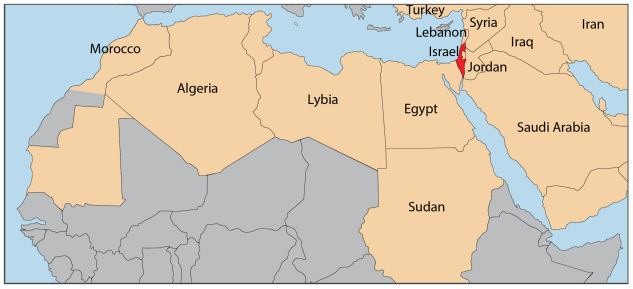
Location: Israel is located at the eastern end of the Mediterranean Sea, where Europe, Africa, and Asia meet. The country borders Lebanon and Syria in the north, Jordan to the east, and Egypt to the south.
Hierarchy Structure of Israel
Israel is a parliamentary democracy consisting of legislative, executive, and judicial branches. Its institutions are the presidency, the Knesset (parliament), the government (cabinet of ministers), and the judiciary.
The system is based on the principle of separation of powers, in which the executive branch (the government) is subject to the confidence of the legislative branch (the Knesset) and the independence of the judiciary is guaranteed by law.
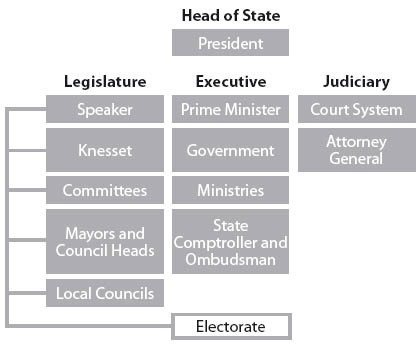
Israel is a parliamentary democracy with a hierarchical structure that includes several levels of government and authority. The hierarchy is as follows:
Prime Minister: The Prime Minister is the head of the Israeli government and holds the highest executive authority. They are usually the leader of the political party or coalition that holds the majority of seats in the Knesset (the Israeli parliament). The Prime Minister is responsible for forming a government, making policy decisions, and representing Israel internationally.
Cabinet: The Cabinet is composed of government ministers, each responsible for a specific government department or portfolio (such as defense, finance, foreign affairs, etc.). The Cabinet is headed by the Prime Minister and collectively makes important policy decisions.
Knesset: The Knesset is the unicameral parliament of Israel. It is composed of 120 members (known as Knesset members or MKs) who are elected through proportional representation. The Knesset passes laws, approves the national budget, and exercises legislative oversight over the government’s activities.
President: The President of Israel is a largely ceremonial role, serving as the head of state. The President’s duties include representing the country at official events, receiving foreign dignitaries, and granting pardons based on the recommendation of the Justice Minister.
Supreme Court: The Supreme Court of Israel is the highest judicial authority in the country. It serves as a court of appeals for lower courts and has the authority to hear cases related to constitutional matters and administrative decisions. The Court also plays a role in safeguarding democratic principles and human rights in Israel.
Districts: Israel is divided into six administrative districts, each headed by a District Commissioner. These districts are further divided into municipalities and local councils. Local governments have varying degrees of autonomy and responsibility for issues like education, local planning, and public services.
Local Authorities: Israel has various local authorities, including municipalities and local councils. These entities are responsible for managing local affairs, infrastructure, and services within their jurisdictions.
Israel Constitutions
Israel has no written constitution. Various attempts to draft the formal document since 1948 have fallen short of the mark, and instead, Israel has evolved a system of basic laws and rights, which enjoy semi-constitutional status. This provisional solution is increasingly inadequate for Israel’s needs, and the necessity for completing this historic task has never been so urgent.
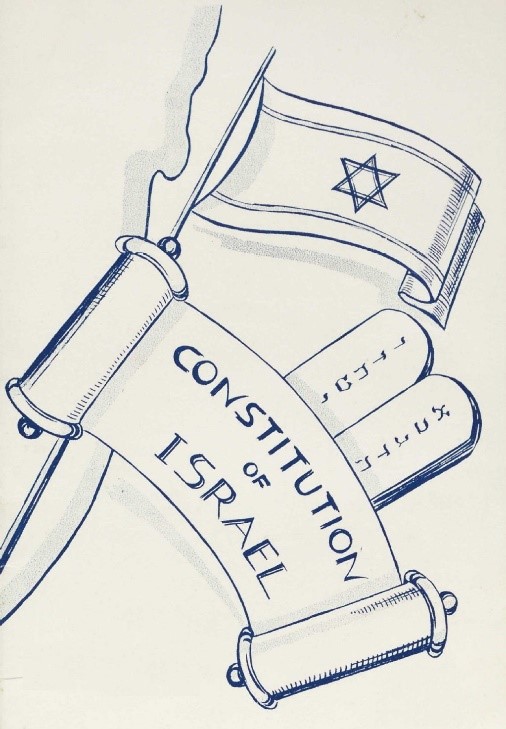
In May 2003, the Constitution, Law, and Justice Committee of the Knesset, chaired by Member of Knesset Michael Eitan, initiated the Constitution by Broad Consensus Project, which aims to write a constitution for the State of Israel. The Committee has been meeting weekly since then to consolidate a draft of a constitution that will enjoy wide support among Israelis and Jews worldwide. The proposed constitution will ultimately be brought to the Knesset and the people for consideration and ratification.
The Committee believes that since Israel is the democratic state of the Jewish people, it is appropriate to appeal to the worldwide Jewish community and invite their input on central constitutional issues, particularly regarding those questions which involve the relationship between Israel and the Jewish people.
Israel does not have a formal written constitution in the traditional sense. Instead, it has a collection of Basic Laws that serve as constitutional provisions. These Basic Laws cover various aspects of governance, rights, and institutions. Amendments to these Basic Laws require a special majority in the Knesset (Israeli parliament). Some notable amendments include:
Basic Law: Human Dignity and Liberty (1992): This Basic Law guarantees fundamental rights to all individuals in Israel, including the right to life, privacy, and freedom of expression. While not an amendment per se, its enactment was a significant step in strengthening constitutional protections.
Basic Law: Freedom of Occupation (1994): This Basic Law ensures the right to work and pursue a chosen occupation. It emphasizes the importance of maintaining individual rights within the framework of a democratic society.
Basic Law: The Knesset (1992, amended multiple times): This Basic Law outlines the structure, functions, and powers of the Knesset, Israel’s parliament. Amendments to this law have addressed issues such as the disqualification of candidates and parties that deny Israel’s existence as a Jewish and democratic state.
Basic Law: Government (2001): This Basic Law details the structure and powers of the government, including the role of the Prime Minister and ministers. It also regulates matters related to the formation and dissolution of the government.
Basic Law: Jerusalem, Capital of Israel (1980): This Basic Law declares Jerusalem as the united capital of Israel. While not specifically amended, its status and implications have been a subject of international debate and contention.
Basic Law: Referendum (2014): This Basic Law outlines the circumstances under which certain significant decisions, such as territorial changes involving areas under Israeli sovereignty, would require approval through a national referendum.
Federal Government
Executive Authority: The executive authority of the state is the government (cabinet of ministers), charged with administering internal and foreign affairs, including security matters. Its policy-making powers are very wide, and it is authorized to take action on any issue which is not legally incumbent upon another authority.
The cabinet determines it working the formation of a government, a list of ministers for Knesset approval, together with an outline of proposed government guidelines. All the ministers must be Israeli citizens and residents of Israel and all must be Knesset members.
Once approved, the ministers are responsible to the prime minister for the fulfillment of their duties and accountable to the Knesset for their actions. Most ministers are assigned a portfolio and head a ministry; ministers who function without a portfolio may be called upon to assume responsibility for special projects. The prime minister may also serve as a minister with a specific portfolio.
Ministers, with the approval of the prime minister and the government, may appoint a deputy minister in their ministry; all must be Knesset members.
Like the Knesset, the government usually serves for four years, but its term may be shortened by the resignation, incapacitation, or death of the prime minister or a vote of no-confidence by the Knesset.
If the prime minister is unable to continue in office due to death, incapacitation, resignation, or impeachment, the government appoints one of its members (and decision-making procedures. It usually meets once a week, but additional meetings may be called as needed. It may also act through ministerial committees.
Forming a government: All governments to date have been based on coalitions of several parties since no party has ever received enough Knesset seats to form a government by itself.
Following consultations, the president presents one Knesset member with the responsibility of forming a government. To do so, this Knesset member has to present, within 28 days of being given responsibility for must be a Knesset member) as acting prime minister.
In case of a vote of no-confidence, the government and the prime minister remain in their positions until a new government is formed.
Legislature branch: The Knesset (Israel’s unicameral parliament) is the country’s legislative body.
The Knesset (Israel’s unicameral parliament) is the country’s legislative body. The Knesset took its name and fixed its membership at 120 from the Knesset Hagedolah (Great Assembly), the representative Jewish council convened in Jerusalem by Ezra and Nehemiah in the 5th century BCE.
A new Knesset begins to function after general elections, which determine its composition. In the first session, Knesset members declare their allegiance, and the Knesset speaker and deputy speakers are elected. The Knesset usually serves for four years but may dissolve itself or be dissolved by the prime minister at any time during its term. Until a new Knesset is formally constituted following elections, full authority remains with the outgoing one.
The Knesset operates in plenary sessions and through 15 standing committees. In plenary sessions, general debates are conducted on legislation submitted by the government or by individual Knesset members, as well as on government policy and activity. Debates are conducted in Hebrew, but members may speak Arabic, as both are official languages. Simultaneous translation is available.
To become law, a regular state bill must pass three readings in the Knesset (while private bills have four readings). In the first reading, the bill is presented to the plenary, followed by a short debate on its contents, after which it is referred to the appropriate Knesset committee for detailed discussion and redrafting, if necessary. When the committee has completed its work, the bill is returned to the plenary for its second reading, at which time committee members who have reservations may present them to the plenary. Following a general debate, each article of the bill is put to a vote and, unless it is necessary to return it to committee, the third reading takes place immediately, and a vote is taken on the bill as a whole. If the bill passes, it is signed by the presiding speaker and is later published in the Official Gazette, with the signatures of the president, prime minister, Knesset speaker, and the minister responsible for the law’s implementation. Finally, the state seal is affixed to it by the minister of justice, and the bill becomes law.
Judiciary: The independence of the judiciary is guaranteed by law. Judges are appointed by the president, upon recommendation of a nominations committee comprised of Supreme Court judges, members of the bar, and public figures. Appointments are permanent, with mandatory retirement at age 70.
Special Courts (1 judge): Traffic, labor, juvenile, military, and municipal courts, with clearly defined jurisdiction; administrative tribunals.
Religious Courts (1 or 3 judges): Jurisdiction in matters of personal status (marriage, divorce, maintenance, guardianship, adoption) vested in judicial institutions of the respective religious communities: Jewish rabbinical courts, Muslim sharia courts, Druze religious courts, ecclesiastical courts of the ten recognized Christian communities in Israel.
Magistrates’ Court (1 judge): Civil and minor criminal offenses; jurisdiction in civil and criminal cases.
District Court (1 or 3 judges): Appellate jurisdiction over magistrates’ courts; original jurisdiction in more important civil and criminal cases.
Supreme Court (1, 3, 5 or a larger uneven number of judges): Ultimate appellate jurisdiction nationwide; right to address issues when necessary to intervene for the sake of justice; authority to release persons illegally detained or imprisoned; sitting as a High Court of Justice, hears petitions against any government body or agent and is the court of first and last instance.
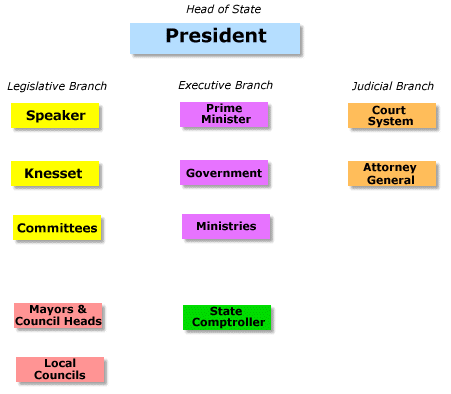
Local Government
Services provided by local government include education, culture, health, social welfare, road maintenance, public parks, water, and sanitation. Each local authority functions through by-laws complementing national laws, which have been approved by the Ministry of the Interior. Some authorities operate special courts in which transgressors of local by-laws are tried. Financing for local authorities comes from local taxes, as well as allocations from the state budget. Every authority has a comptroller who prepares an annual report.
The law recognizes three types of local authorities: municipalities, which provide the framework for urban centers with populations of over 20,000; local councils, which manage towns with populations of between 2,000 and 20,000; and regional councils, which are responsible for several villages grouped within a certain radius.
Each local authority is administered by a mayor or chairperson and a council. The number of council members is determined by the Ministry of the Interior, according to the authority’s population. Currently, there are 73 municipalities, 124 local councils, and 54 regional councils.
All municipalities and local councils are united, voluntarily, in a central body, the Union of Local Authorities, which represents them before the government, monitors relevant legislation in the Knesset and provides guidance on issues such as work agreements and legal affairs. Affiliated with the International Association of Municipalities, the union maintains ties with similar organizations throughout the world and arranges twin cities programs and exchanges of international delegations.
Elections
Elections are general, national, direct, equal, secret, and proportional. The entire country constitutes a single electoral constituency, and all citizens are eligible to vote from age 18. On Election Day, voters cast a ballot for a political party to represent them in the Knesset.

Election Day is a national holiday, free transportation is available to voters who happen to be outside their polling district on that day and polling stations are provided for military personnel, hospital patients, and prisoners, as well as for merchant seamen and Israelis on official assignment abroad.
The Central Elections Committee, headed by a justice of the Supreme Court and including representatives of the parties holding Knesset seats, is responsible for conducting the elections. Regional election committees oversee the proper functioning of local polling committees, which include representatives of at least three parties in the outgoing Knesset.
In each election to date, between 77 and 90 percent of all registered voters have cast their ballots, expressing the great interest taken by most Israelis in their national and local politics.
Knesset elections are based on a vote for a party rather than for individuals, and the many political parties that run for the Knesset reflect a wide range of outlooks and beliefs.
Local Elections: Elections for local government are conducted by secret ballot every five years. All permanent residents, whether Israeli citizens or not, are eligible to vote in local elections from age 17 and to be elected from age 21. In elections for municipal and local councils, ballots are cast for a party list of candidates, with the number of council seats attained by each list proportional to the percentage of votes received. Mayors and chairpersons of local councils are elected directly.
In regional council elections, one candidate from each village is elected by a simple plurality, with those elected becoming members of the council. Heads of regional councils are selected from among the regional council’s members.
Local elections are financed by government appropriations, based on the number of mandates that each faction or list wins in the local authority.
Political Parties: Israel has a dynamic political landscape with a range of parties representing diverse ideologies and interests. Some of the major political parties active at that time include:
Likud Party: The Likud Party started as a group of parties that united in 1973 just before the elections to the 8th Knesset and included Herut, the Liberal Party, the Free Center, the National List, and the Labor Movement for Greater Israel. A right-wing party and one of the largest in Israel, Likud is associated with conservative and nationalist positions. It has been traditionally supportive of security and defense policies and has been in power for various periods.
Blue and White Party: Blue and White is a centrist electoral list established in the run-up to the 2019 elections. It includes the Israel Resilience Party, Telem, and Yesh Atid. The former two (headed by Benny Ganz and Moshe Ya’alon respectively) were formed in late 2018 and decided to run together. Following intensive efforts, Yesh Atid’s leader Yair Lapid also decided to head his party into the list. Blue and White is a Zionist Liberal party located in the center of the political map. Formed as a centrist alliance, the party aimed to offer an alternative to Likud’s dominance. It emphasized issues like security, economic stability, and social unity. Blue and White dissolved after internal disagreements, and its members returned to their original parties.
Yesh Atid: A centrist party focused on socio-economic issues, Yesh Atid advocates for reducing the cost of living, promoting education, and creating a more equitable society. Yesh Atid became the first Israeli political party to form an “Anglo women’s division” on February 29, 2016, to attract new voters. The Anglo women’s division will focus on women’s issues and female representation in government.
Shas: Shas was founded by ultra-Orthodox Sephardic Jews in response to their sense that they were at an institutional disadvantage and were under-represented in Israeli politics in comparison to Ashkenazi Haredim. With the establishment of Shas on the national level, the Council of Torah Sages, headed by Rabbi Ovadia Yosef, was also established. Rabbi Menachem Shach, the head of the Lithuanian (non-Hasidic) ultra-Orthodox community, and Rabbi Yosef served as the Council’s highest decision-makers. After 1990, Rabbi Shach resigned from this position, leaving Rabbi Ovadia Yosef as the sole spiritual leader of the Shas party. A religious party primarily representing Sephardic and Mizrahi Jews, Shas focuses on issues important to the religious community, such as religious education, family values, and social welfare.
United Torah Judaism: United Torah Judaism (UTJ) promotes the interests of the Haredi community in Israel in the areas of education and welfare and regarding specific issues such as army service. It also works to preserve the religious character of the State of Israel. In September 1999, during the 15th Knesset, United Torah Judaism even left the coalition in protest against the shipment of a turbine to the Ashkelon power station on the Jewish Sabbath. Regarding foreign policy and security, United Torah Judaism is a centrist party, which determines its positions based on religious concerns more than security concerns or diplomatic considerations Another religious party, United Torah Judaism, represents the Ashkenazi Haredi community. It also prioritizes religious matters and preserving the traditional way of life.
Immigration System of Israel
- Immigration Overview
- Types of Immigration
- Asylum
- The Asylum Process
Israel Immigration Overview
Immigrating to Israel, a country with a rich history and diverse culture is facilitated through various pathways, including the unique Law of Return for Jews worldwide, family reunification, employment opportunities, and educational pursuits. New immigrants often benefit from financial support, language courses, and housing assistance to ease their transition. Israel offers a dynamic environment for skilled professionals, particularly in the technology and innovation sectors.
However, prospective immigrants should be prepared for cultural adaptation and navigate the complexities of the region’s political and security landscape. Israel’s immigration policies evolve, so it’s crucial to consult official sources for the latest information when considering this vibrant and multifaceted destination for immigration.
Legal immigration: Legal immigration to Israel primarily occurs through various established channels, including Aliyah (Jewish immigration), family reunification, employment-based visas, student visas, and tourist visas. Under the Law of Return, Jews from around the world have the right to immigrate to Israel. Family members of Israeli citizens or residents can reunify with their loved ones, while those with job offers can obtain work visas. Students accepted by Israeli educational institutions can apply for student visas, and tourists can enter the country with tourist visas.
Visa Categories: Israel provides a range of visa categories tailored to diverse immigration and travel purposes. The primary options encompass Tourist Visas for short-term visitors, Student Visas for international students, Work Visas for foreign employees with job offers, Family Reunification Visas facilitating the reunion of immediate family members with Israeli citizens or residents, Temporary Resident Visas for those intending to establish long-term residency, and the unique Aliyah Visa, which is exclusively available to Jewish immigrants under the Law of Return, offering substantial support and integration services.
Naturalization: Naturalization in Israel refers to the process through which foreign nationals can become Israeli citizens. To be eligible for naturalization, individuals typically need to meet certain residency requirements, demonstrate proficiency in Hebrew, and pass a citizenship test on Israeli culture, history, and the legal system. Additionally, they must pledge allegiance to the State of Israel and renounce any other citizenship they hold, as Israel generally does not allow dual citizenship.
Application process: The immigration application process to Israel typically begins with determining your eligibility for one of the available immigration categories, such as Aliyah (for Jewish immigrants), family reunification, work, or student visas. You will need to gather and submit the required documents, which may include proof of Jewish heritage for Aliyah or family relationship documents for family reunification. After submitting your application, there may be interviews and additional documentation requests. If approved, you’ll receive the appropriate visa, which comes with its own set of benefits and requirements.
Importance of legal assistance: Legal assistance is of paramount importance for immigration to Israel due to the complex and evolving nature of immigration laws and regulations. Navigating the intricacies of Israeli immigration requires expert guidance to ensure applicants meet eligibility criteria, compile necessary documentation, and adhere to legal procedures. Immigration lawyers play a crucial role in helping individuals and families understand their rights and options, completing application forms, and representing clients before Israeli immigration authorities.
Rights and responsibilities: Immigrating to Israel comes with both rights and responsibilities. Immigrants, especially those who become Israeli citizens, enjoy a range of rights, including access to social services, education, healthcare, and employment opportunities. They have the right to vote and participate in the democratic process, as well as the freedom to practice their religion and culture.
However, immigrants are also responsible for adhering to Israeli laws and regulations, including military service requirements for eligible citizens, paying taxes, and contributing to the country’s economic and social fabric. Additionally, integrating into Israeli society, learning Hebrew, and respecting the nation’s diverse cultural norms are vital responsibilities for immigrants to foster a sense of belonging and coexistence within the country.
Resources and support: Immigration to Israel is supported by a range of resources and services designed to assist newcomers in their transition. Government agencies such as the Ministry of Aliyah and Integration provide financial aid, language courses, and housing support to eligible immigrants.
Nonprofit organizations like the Jewish Agency and Nefesh B’Nefesh offer guidance and practical assistance, helping newcomers navigate bureaucratic processes and find employment opportunities. Educational institutions and community centers also provide integration programs and social support to foster a sense of belonging.
These combined efforts aim to facilitate a smooth and successful transition for immigrants as they embrace Israel’s culture and opportunities.
Types of immigration
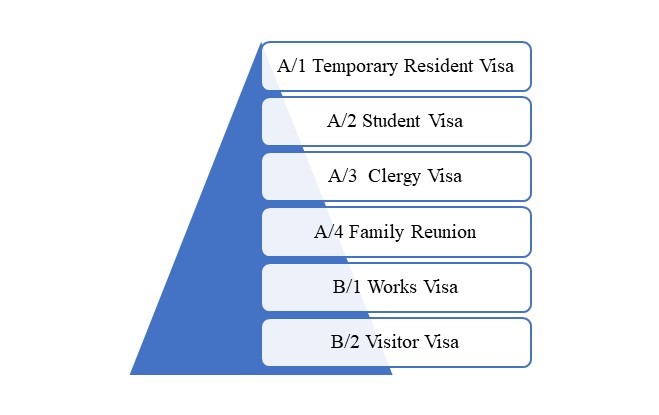
A/1 Temporary Resident Visa: The A/1 Temporary Resident Visa in Israel is a short-term visa category typically issued to foreign nationals seeking to immigrate under the Law of Return. It allows individuals who are eligible for Aliyah (Jewish immigration) to live and work in Israel temporarily while they complete the immigration process. This visa provides newcomers with an initial period of stay to begin their integration into Israeli society, which may include language courses and access to various support services. It’s an essential step in the immigration process for eligible individuals as it grants them legal status in Israel during their initial settlement period, allowing them to access various benefits and services as they transition to their new life in the country.
A/2 Student Visa: The A/2 Student Visa is a type of visa for individuals who wish to study in Israel. This visa allows foreign students to enroll in academic or vocational programs at recognized Israeli educational institutions. To obtain an A/2 Student Visa, applicants typically need to provide proof of acceptance from an Israeli educational institution and demonstrate sufficient financial means to support themselves during their studies. The visa is usually issued for the duration of the academic program, and students can extend it as needed. It’s important to note that while holding an A/2 Student Visa, individuals are generally not permitted to work in Israel unless they obtain a separate work permit.
A/3 Clergy Visa: The A/3 Clergy Visa is a specific type of visa for religious clergy members seeking to immigrate to Israel. This visa is designed to accommodate individuals planning to work in a religious capacity, such as priests, rabbis, or imams, within recognized religious institutions in Israel. To obtain an A/3 Clergy Visa, applicants typically need to provide documentation demonstrating their religious affiliation, a job offer from a recognized religious institution, and proof of their qualifications as clergy members. Once granted, this visa permits them to live and work in Israel temporarily, usually for the duration of their religious duties or assignments.
A/4 visa for spouses and children: A/4 visa for spouses and children is specifically designed for spouses and children of foreign workers or residents in the country. This visa allows them to join their family members who are already living and working in Israel. To qualify for the A/4 visa, applicants need to demonstrate their relationship to the Israeli resident or worker. Once obtained, this visa permits spouses and children to live, study, and work in Israel for the duration of the sponsoring family member’s stay. It’s crucial to note that the A/4 visa is tied to the principal applicant’s status, and if they leave Israel, the dependents’ visas may also be affected. Therefore, it’s essential to keep immigration authorities informed of any changes in the family’s situation or the principal applicant’s status to ensure legal compliance and uninterrupted residency.
B/1 work visa: The B/1 Work visa is a type of Israeli visa designed for foreign nationals seeking employment in Israel. To obtain a B/1 visa, applicants typically need a job offer from an Israeli employer. This visa allows individuals to work legally in Israel for a specific employer and is usually granted for a set period, often linked to the duration of the employment contract. B/1 visa holders are expected to abide by the terms of their employment and may be subject to renewal if they continue working for the same employer. It’s important to note that this visa does not grant permanent residency or citizenship.
B/2 visitor visa: The B/2 Visitor’s visa in Israel is designed for individuals who wish to temporarily visit the country for purposes such as tourism, business meetings, conferences, or short-term courses. It typically allows for stays of up to three months, but extensions may be possible in some cases. Unlike immigration visas like Aliyah, the B/2 visa does not grant the right to work or reside in Israel long-term. Applicants must provide documentation supporting the purpose of their visit, maintain sufficient financial means to cover their stay and return to their home country when the visa expires.
Asylum
Asylum is a legal protection and status granted by a government to individuals who have fled their home countries due to a well-founded fear of persecution based on factors such as race, religion, nationality, political opinion, or membership in a particular social group. The concept of asylum is rooted in international and domestic law, and it is designed to provide safety and refuge to those who are at risk of harm in their home countries. Here are the major elements and components of asylum:
Refugee Definition: To qualify for asylum, an individual must meet the legal definition of a refugee. This definition is typically based on international agreements, such as the 1951 United Nations Convention Relating to the Status of Refugees and its 1967 Protocol. According to these agreements, a refugee is someone who has a well-founded fear of persecution based on certain protected grounds, as mentioned earlier.
Persecution: Persecution refers to the serious and sustained harm or mistreatment that individuals face in their home country. It can take various forms, including physical violence, torture, discrimination, harassment, imprisonment, or threats to life or freedom.
Well-Founded Fear: To be eligible for asylum, an individual must demonstrate a well-founded fear of persecution. This means that there must be a reasonable basis for believing that they would be at risk of harm if they were forced to return to their home country.
Protected Grounds: Asylum claims are typically based on one or more of the following protected grounds:
Race: Persecution based on a person’s race, ethnicity, or skin color.
Religion: Persecution based on a person’s religious beliefs or practices.
Nationality: Persecution based on a person’s nationality or membership in a particular ethnic or national group.
Political Opinion: Persecution of individuals with specific political beliefs or affiliations.
Membership in a Particular Social Group: Persecution of individuals due to their membership in a specific social group, which can be defined in various ways, including gender, sexual orientation, or other characteristics.
Application Process: Asylum seekers must follow a formal application process in the host country. This typically involves submitting an asylum application, attending interviews with immigration authorities, and providing evidence to support their claim.
Non-Refoulement: One of the fundamental principles of asylum is the principle of non-refoulement, which prohibits the deportation or return of asylum seekers to a country where they would face persecution. This principle is enshrined in international law.
Legal Rights and Protections: Asylum seekers are entitled to certain legal rights and protections during the asylum process. These may include access to legal counsel, the right to work, access to healthcare and education, and freedom from detention in some cases.
Status Determination: Immigration or asylum authorities in the host country are responsible for determining whether an individual qualifies for refugee status. This process involves evaluating the credibility of the asylum seeker’s claim and assessing the level of risk they face in their home country.
Appeals Process: If an asylum claim is denied, many countries provide an appeals process that allows applicants to challenge the decision. This process may involve presenting additional evidence or legal arguments.
Resettlement: In some cases, if an individual is granted asylum, they may have the option to apply for resettlement in a third country if they are unable to return to their home country or integrate into the host country.
Asylum is a critical mechanism for protecting the rights and safety of individuals who are forced to flee their countries due to persecution. It is governed by a complex framework of international and domestic laws and regulations, which can vary from one country to another.
The Asylum Process
Seeking asylum in Israel involves a detailed legal process designed to assess an individual’s eligibility for refugee status. Here is a brief overview of the steps involved:
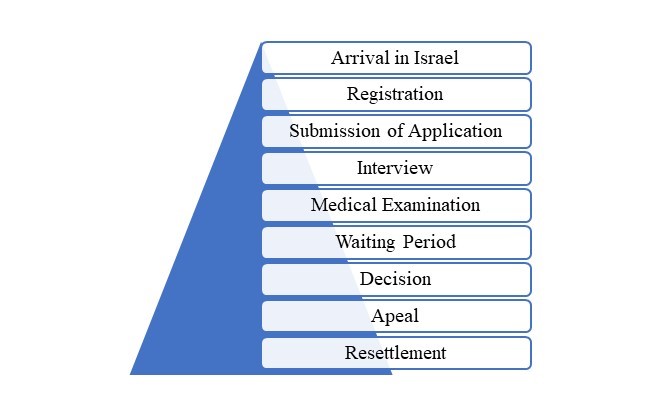
Arrival in Israel: Asylum seekers typically arrive in Israel on tourist visas or other means. They must be physically present in Israel to start the asylum application process. Arrival in Israel as a process of seeking asylum involves several crucial steps. Asylum seekers typically arrive in Israel, often through irregular channels or crossing the border, fleeing persecution, conflict, or other life-threatening circumstances in their home countries. Upon arrival, they may be detained temporarily for security and administrative purposes, and their identity and background are screened.
Registration: Registering at the Population and Immigration Authority (PIBA) as part of the asylum-seeking process in Israel is a crucial step for individuals fleeing persecution and seeking refuge. To initiate their asylum claim, individuals must first arrive in Israel and approach PIBA’s offices. There, they undergo an initial registration process, during which they provide personal information, background details, and the reasons for seeking asylum. This information helps PIBA assess their eligibility for refugee status under international and Israeli law. Upon arrival in Israel, asylum seekers should report to the Population and Immigration Authority (PIBA) to register their presence in the country. Failure to do so may result in detention or deportation.
Submission of Asylum Application: Asylum seekers can formally apply for asylum by applying to the Ministry of Interior’s Refugee Status Determination (RSD) unit. This unit is responsible for processing asylum claims.
You can Complete and submit the Refugee status determination application online. After the submission of the application, you will get an email confirmation to the email you provided on your application. This is not confirmation that your application has been submitted. You will be scheduled an appointment to confirm your details in person with the Border Control Officer in Charge at the enforcement facility in Bnei Brak. After confirming your details in person at the enforcement facility, you will be referred for further handling which will include an interview
Interview: After applying, applicants will undergo an interview with immigration officials. During this interview, they will be asked to provide detailed information about their reasons for seeking asylum and their experiences in their home country. During the asylum interview, the asylum seeker meets with an immigration officer or caseworker from PIBA. The interview is a crucial opportunity for the applicant to present their case for asylum.
Documentation: Asylum seekers are encouraged to provide any evidence, documents, or witnesses that support their claim. This could include personal testimonies, medical records, photographs, or other relevant materials.
Reasons for Asylum: The applicant must explain in detail why they are seeking asylum in Israel. This typically involves recounting the persecution, threats, or violence they faced in their home country. Asylum seekers should demonstrate that they fear returning to their country of origin due to a well-founded fear of persecution based on factors like race, religion, nationality, political opinion, or membership in a particular social group.
Language Barrier: Language can sometimes be a barrier during the interview, especially if the asylum seeker does not speak Hebrew or English fluently. In such cases, interpreters may be provided to ensure clear communication.
Medical Examination: Applicants may also undergo a medical examination to document any injuries or trauma they have suffered that can serve as evidence of persecution.
Waiting Period: After submitting the application and undergoing the interview, asylum seekers may need to wait for a decision on their case. This waiting period can vary in length.
Decision: The RSD unit will evaluate the asylum claim and determine whether the applicant meets the criteria for refugee status under Israeli law. If approved, the applicant will be recognized as a refugee and granted asylum status.
Appeals: If the asylum application is denied, applicants have the right to appeal the decision within a specified timeframe. The appeal process involves presenting additional evidence or arguments to support their claim.
Resettlement or Temporary Protection: If an asylum claim is approved, the applicant will be granted refugee status, which may include certain rights and protections. Israel provides some assistance to refugees but does not grant them permanent residency or citizenship.
If your application is approved, you will be issued a permit by the asylum seeker handling process
Required Documents
- You must attach a clear, readable copy of your passport.
- You must provide your full contact details, including an email and telephone number.
- If you are in a holding facility you need to apply through the facility administration.
If you do not complete the application correctly, it will be denied.
Highlights
- Complete the application in English
- Make sure to include detailed information and answers to questions about your application for asylum
- Make sure your answers are in the correct fields on the online application
- Only use the online application to apply. Do not use the paper application form
- You must attend your meeting at the enforcement facility in Bnei Brak. If you do not, you will lose your right to apply for asylum.
- If you do not have an appointment, you will not be permitted to enter the Bnei Brak Population and Immigration Authority.
- Due to the coronavirus outbreak, you must wear a face mask that covers your mouth and nose. You will not be permitted to enter without a face mask, by Public Health Order (Novel Coronavirus)
- Applications made by unaccompanied minors, those suffering from mental health disorders, or victims of torture, will be handled with particular attention, care, and sensitivity to the circumstances.
It’s important to note that Israel’s asylum policies have been subject to controversy and change over the years, and the government has taken various measures to deter irregular migration. Therefore, asylum seekers should seek legal counsel or assistance from organizations that specialize in refugee and asylum issues to navigate the process effectively and understand the most current policies and procedures. Additionally, the asylum process can be time-consuming, and applicants may face challenges during the waiting period, including issues related to housing, employment, and access to services.
Financial System of Israel
- Overview of Israel
- Financial System
- Banking System
- Capital Market
- Insurance System
- Investment Funds
- Regulatory Authorities
- Financial Technology
Overview of the financial system
The financial system refers to the comprehensive network of institutions, markets, regulations, and mechanisms that facilitate the flow of funds and financial resources within an economy. It plays a fundamental role in supporting economic activities by efficiently channeling savings into investments, facilitating transactions, managing risks, and promoting economic growth.
The key components of a country’s financial system include banks, financial markets (such as stock and bond markets), insurance companies, pension funds, regulatory authorities, and various financial intermediaries. The financial system also encompasses the legal and regulatory framework that governs financial transactions and activities, ensuring transparency, stability, and the protection of investors and consumers. Overall, a well-functioning financial system is critical for the efficient allocation of capital, economic development, and the stability of a nation’s economy.

Israel’s financial system is a robust and well-regulated network of institutions and markets that facilitate the flow of capital and financial services within the country. It comprises commercial banks, investment banks, a stock exchange (Tel Aviv Stock Exchange), and a bond market, along with insurance companies and pension funds. The central regulatory authority is the Bank of Israel, responsible for monetary policy and banking supervision. Additionally, the Ministry of Finance oversees fiscal policies and taxation. Israel’s financial system is bolstered by a thriving FinTech sector, and its currency, the New Israeli Shekel (NIS), plays a pivotal role in international trade. This financial system is crucial in supporting the nation’s dynamic and innovation-driven economy while ensuring stability and investor protection.
Banking System
Israel’s banking sector is a significant component of the country’s financial system, providing a wide range of financial services to both individuals and businesses. The sector is characterized by various types of banks, each serving specific purposes and customer segments. Here are the main types of banks in Israel’s banking sector:

Commercial Banks: There are two categories mentioned below that come under the umbrella of commercial banks:
Retail Banks: These banks serve individual consumers and offer a broad range of retail banking services, including savings and checking accounts, personal loans, mortgages, credit cards, and financial advisory services. Some of the major retail banks in Israel include Bank Hapoalim, Bank Leumi, Mizrahi Tefahot Bank, and First International Bank of Israel (FIBI).
Corporate Banks: Corporate or business banks primarily cater to the financial needs of large corporations, small and medium-sized enterprises (SMEs), and institutional clients. They provide corporate lending, trade finance, treasury services, and cash management services. The major commercial banks also have dedicated corporate banking divisions.
Investment Banks: Investment banks in Israel focus on providing specialized financial services related to capital markets and investment banking. These services may include asset management, underwriting of securities (such as IPOs and bond issuances), mergers and acquisitions (M&A) advisory, and wealth management. Prominent investment banks in Israel include Psagot Investment House, Excellence Investment House, and Meitav Dash.
Savings and Cooperative Banks: These banks are typically smaller in size and often have a more community-oriented focus. They provide traditional banking services like savings accounts, loans, and mortgages. While they are less prevalent than commercial banks, they serve an important role in some regions of Israel.
Foreign Banks: Several foreign banks operate in Israel, providing banking services primarily to international clients and businesses. They often specialize in cross-border transactions, foreign exchange services, and trade finance for multinational corporations.
Online and Digital Banks: Israel has seen the emergence of digital and online banks that operate exclusively through digital channels, without physical branch networks. These banks offer a range of financial services, including checking and savings accounts, payment services, and mobile banking apps. They are designed to cater to tech-savvy consumers who prefer online banking. Examples include Bank Yahav, Bank Otsar Ha-Hayal, and Discount Bank’s “Super-Phon” service.
Development and Mortgage Banks: These banks focus on providing long-term financing for housing and real estate projects. They play a crucial role in the real estate market, particularly in funding residential development and providing mortgages to homebuyers. The Israel Mortgage & Real Estate Corporation (known as “Tosea” in Hebrew) is a notable example.
Central Bank: The Bank of Israel, the country’s central bank, regulates and oversees the entire banking sector. It controls monetary policy, manages foreign exchange reserves, and ensures the financial system’s stability.
The Israeli banking sector is well-regulated and stable, with strict supervision by the Bank of Israel and other relevant authorities to maintain the integrity of the financial system. The sector’s diversity and competition contribute to the overall health and innovation within Israel’s financial industry, supporting the country’s robust economy.
Capital Market
Israel’s capital market plays a crucial role in the country’s economy by facilitating the allocation of funds from investors to businesses and government entities. It consists of various financial instruments and markets where securities are bought and sold. Here’s an explanation of Israel’s capital market and its primary types:

Stock Market: The primary stock exchange in Israel is the Tel Aviv Stock Exchange (TASE). TASE is one of the largest stock exchanges in the Middle East. It provides a platform for the trading of equities (stocks) issued by publicly listed companies. Companies list their shares on TASE to raise capital by selling ownership stakes to investors. Investors can buy and sell these shares, and the stock market provides liquidity for these transactions. TASE has different segments, including the Tel Aviv 35 Index (TA-35), which includes the 35 largest companies by market capitalization on the exchange.

Bond Market: Israel’s bond market is robust and includes both corporate and government bonds. Government bonds issued by the Israeli government are known as Israel Government Bonds (IGBs). Corporate bonds are issued by private companies to raise capital. These bonds pay interest to bondholders, and their value can fluctuate based on market conditions. IGBs are considered relatively safe investments and are often used by both domestic and international investors for income and capital preservation.
Derivatives Market: TASE also operates a derivatives market where investors can trade options and futures contracts. Derivatives are financial instruments whose value is derived from an underlying asset, such as a stock or an index. Options and futures contracts can be used for hedging against price fluctuations, speculation, and portfolio management.
Real Estate Investment Trusts (REITs): Israel has a growing market for Real Estate Investment Trusts, or REITs. These are investment vehicles that allow individuals and institutions to invest in a diversified portfolio of real estate assets. REITs in Israel provide investors with exposure to income-producing real estate properties, such as commercial, residential, and industrial properties.
Private Equity and Venture Capital: While not part of the public capital market, private equity and venture capital are essential components of Israel’s overall financial ecosystem. Israel has a vibrant startup and technology sector, and private equity and venture capital firms play a significant role in funding and nurturing these companies.
Foreign Investment: Israel actively encourages foreign investment in its capital markets. Foreign investors can participate in the stock and bond markets, and the government offers various incentives and protections to attract foreign capital.
Regulation and Oversight: The capital market in Israel is regulated by the Israel Securities Authority (ISA), which ensures that market participants adhere to securities laws and regulations. The ISA aims to maintain market integrity, protect investors, and promote transparency in the capital market.
In summary, Israel’s capital market is a diverse and dynamic ecosystem comprising various types of financial instruments and markets. It serves as a critical source of financing for businesses, a means of investment for individuals and institutions, and a driver of economic growth and development in the country. The market is regulated to ensure fair and transparent operations while encouraging both domestic and foreign investment.
Insurance system
Israel has a well-developed insurance industry that provides various types of insurance coverage to individuals and businesses. Insurance in Israel is regulated by the Ministry of Finance and supervised by the Capital Market, Insurance, and Savings Authority. Here are some of the main types of insurance available in Israel:

Life Insurance: Term life insurance provides coverage for a specified period, usually with a fixed premium for the duration of the policy. If the insured person passes away during the policy term, a death benefit is paid to the beneficiary. Whole life insurance offers coverage for the insured person’s entire life. It combines a death benefit with an investment component, allowing the policyholder to build cash value over time.
Non-Life Insurance: Property insurance covers damage or loss to physical assets, including homes, buildings, and personal belongings. It can also include coverage for fire, theft, natural disasters, and vandalism. Liability insurance protects against legal claims and lawsuits. This can include professional liability insurance, public liability insurance, and product liability insurance. Car insurance is mandatory in Israel and typically includes coverage for bodily injury, property damage, and theft. Additional coverage options, such as collision and comprehensive coverage, are also available. Travel insurance offers coverage for unexpected events while traveling, such as trip cancellations, medical emergencies, and lost luggage. While Israel has a universal healthcare system, private health insurance can provide additional coverage for services not covered by the public system, including faster access to specialists and elective procedures.
Workers’ Compensation Insurance: Employers in Israel are required to provide workers’ compensation insurance for their employees. This insurance covers medical expenses and wage replacement for employees who are injured or become ill as a result of their work.
Pension and Retirement Insurance: Pension insurance and retirement savings plans are essential for individuals planning for their retirement. These policies help individuals accumulate savings over their working years, which can then be used to provide income in retirement.
Credit Insurance: Credit insurance, also known as payment protection insurance, covers debt repayment in case of unexpected events, such as unemployment, disability, or death, which may prevent the insured person from making loan or credit card payments.
Marine and Aviation Insurance: These specialized insurance policies cover risks associated with shipping and aviation, including cargo insurance, hull insurance for ships and aircraft, and liability coverage for shipping and aviation-related businesses.
Cyber Insurance: With the increasing importance of digital technology, cyber insurance is becoming more prevalent. It provides coverage for losses and liabilities arising from cyberattacks, data breaches, and other cyber incidents.
Specialty Insurance: Some insurers offer specialty insurance products tailored to unique needs, such as kidnap and ransom insurance, event cancellation insurance, and insurance for high-value items like art and jewelry.
It’s important to note that insurance products and regulations may evolve, so individuals and businesses seeking insurance coverage in Israel should consult with insurance providers and stay informed about the latest developments in the insurance market. Additionally, insurance policies may vary in terms of coverage, exclusions, and pricing, so it’s essential to carefully read and understand the terms and conditions of any insurance policy before purchasing it.
Investment funds
Israel has a thriving investment fund industry that provides various investment opportunities to both domestic and international investors. These investment funds are managed by professional fund managers and offer a diverse range of assets and investment strategies. Here’s an explanation of Israel’s investment funds and their types:
Mutual Funds: There are two types of mutual funds available in Israel that are mentioned below
Open-End Funds: These are the most common type of mutual funds in Israel. They issue and redeem shares daily at their Net Asset Value (NAV). Open-end funds can invest in a wide range of assets, including stocks, bonds, real estate, and money market instruments.
Closed-End Funds: Unlike open-end funds, closed-end funds issue a fixed number of shares during their initial public offering (IPO). After the IPO, shares are traded on stock exchanges like ordinary stocks. Closed-end funds may trade at a premium or discount to their NAV.
Exchange-Traded Funds (ETFs): ETFs are investment funds that trade on stock exchanges, just like individual stocks. They provide exposure to various asset classes and investment strategies. In Israel, ETFs have gained popularity as a cost-effective and liquid way to invest in local and global markets.
Hedge Funds: Hedge funds in Israel are typically offered to accredited investors and institutional investors. They employ various strategies, including long/short equity, event-driven, and global macro, to generate returns. Hedge funds often have higher fees and greater flexibility in their investment approaches compared to traditional mutual funds.
Real Estate Investment Trusts (REITs): Israel has a well-developed real estate market, and REITs allow investors to gain exposure to this sector without directly owning physical properties. REITs typically invest in income-generating properties such as commercial real estate, residential complexes, and infrastructure projects.
Private Equity Funds: Private equity funds pool capital from investors to acquire, invest in, or provide financing for private companies. These funds often target startups, growth-stage companies, or distressed businesses. They may have a longer investment horizon and involve higher risks but potentially higher returns.
Venture Capital Funds: Israel is renowned for its vibrant startup ecosystem, and venture capital funds play a pivotal role in funding early-stage and high-growth startups. These funds invest in companies with innovative technologies and significant growth potential.
Money Market Funds: Money market funds invest in short-term, highly liquid, and low-risk securities like government bonds, treasury bills, and commercial paper. They are suitable for investors seeking safety and liquidity while earning a modest return.
Balanced Funds: Balanced funds, also known as asset allocation funds, invest in a mix of asset classes, such as stocks, bonds, and cash equivalents. These funds aim to provide a balanced risk-return profile, making them suitable for investors with moderate risk tolerance.
Sector-Specific Funds: Some funds in Israel focus on specific sectors or industries, such as technology, healthcare, or energy. These funds allow investors to target their investments in areas they believe have growth potential.
Socially Responsible Investment (SRI) Funds: SRI funds incorporate environmental, social, and governance (ESG) criteria into their investment decisions. They aim to invest in companies that align with sustainable and ethical principles.
Investors in Israel’s investment funds can choose from a wide array of options based on their risk tolerance, investment goals, and preferences. Before investing, it’s essential to conduct thorough research, consider the fund’s track record, fees, and risk factors, and consult with financial advisors if needed to make informed investment decisions.
Regulatory Authorities
Israel’s financial system is governed by several regulatory authorities that oversee various aspects of the financial industry, ensuring its stability, integrity, and fair operation. These regulatory bodies play a critical role in safeguarding the interests of investors, consumers, and the overall financial health of the country. Here’s an explanation of the key regulatory authorities in Israel’s financial system:
Bank of Israel (BOI): The Bank of Israel serves as the country’s central bank and is responsible for formulating and implementing monetary policy. Its primary objective is to maintain price stability and support the overall stability of the financial system. Its functions include controlling the money supply and interest rates to manage inflation and economic growth, managing foreign exchange reserves to influence the exchange rate, supervising and regulating the banking sector to ensure its safety and soundness, and serving as the lender of last resort to financial institutions in times of crisis.
Israel Securities Authority (ISA): The ISA is the regulatory authority responsible for overseeing the capital market and securities industry in Israel. Its functions include regulating the issuance and trading of securities, including stocks, bonds, and mutual funds, supervising and enforcing rules and regulations related to corporate governance and disclosure by publicly traded companies, protecting investors’ interests and ensuring fair and transparent market practices, and licensing and regulating market participants, such as brokers, investment advisers, and portfolio managers.
Ministry of Finance: The Ministry of Finance is responsible for setting fiscal policy, taxation, and economic policies in Israel. Its functions include formulating and implementing budgetary and fiscal policies to support economic stability and growth, administering taxation, including income tax, corporate tax, and value-added tax (VAT), and managing government expenditures and public finance.
Insurance and Pension Supervision Department: This department operates under the Ministry of Finance and is responsible for regulating and supervising the insurance and pension sectors in Israel. Its functions include overseeing insurance companies, ensuring their financial stability, protecting policyholders, regulating and supervising pension funds to safeguard the retirement savings of individuals, and setting rules and standards for insurance and pension products.
Israel Money Laundering and Terror Financing Prohibition Authority (IMPA): IMPA is responsible for preventing money laundering and the financing of terrorist activities within the financial system. Its functions include developing and enforcing anti-money laundering (AML) and counter-terrorist financing (CTF) regulations and guidelines, monitoring financial institutions for compliance with AML/CTF laws, and collaborating with international bodies to combat money laundering and terrorist financing on a global scale.
These regulatory authorities work together to maintain the stability and integrity of Israel’s financial system. They establish and enforce rules and regulations, supervise financial institutions, protect the rights of investors and consumers, and contribute to the overall economic health of the country. Their efforts are crucial in ensuring that Israel’s financial system operates efficiently and transparently, fostering trust and confidence in the financial markets.
Financial Technology (FinTech): Financial Technology (FinTech) plays a pivotal role in Israel’s financial system by driving innovation, enhancing accessibility, and improving the efficiency of financial services. As a global technology hub known for its cutting-edge startups and entrepreneurial spirit, Israel has harnessed its technological prowess to create a thriving FinTech ecosystem. Israeli FinTech companies are at the forefront of developing solutions in areas like digital payments, peer-to-peer lending, blockchain technology, and financial analytics. These innovations not only cater to domestic consumers and businesses but also attract international attention and investment.
By leveraging FinTech, Israel has transformed the way financial services are delivered, making them more user-friendly, cost-effective, and secure. Moreover, the FinTech sector complements the country’s broader economic landscape, especially its thriving high-tech industry, contributing significantly to Israel’s overall economic growth and competitiveness in the global financial arena.
In summary, Israel’s financial system is characterized by a diverse and well-regulated set of institutions and markets that support the country’s economic growth and stability. The government and regulatory authorities work to ensure the system’s integrity and safeguard the interests of investors and consumers. The financial sector also plays a pivotal role in supporting Israel’s dynamic technology and innovation-driven economy.
Israel Credit System
- Overview of the Israel Credit System
- Credit Score in Israel
- Credit Agencies
- Types of Credit Cards in Israel
- Sources of Credit Cards in Israel
- Types of Loans in Israel
Overview of the Israel Credit System
Israel is making solid progress in building a modern, competitive, and open financial system. Through the mid-1980s, the government took a very active role in the allocation of resources, using direct government credits, capital grants, and guarantees. Between the foundation of the state of Israel in the late 1940s and the mid-1980s, the financial system was characterized by a very high degree of government intervention and control.
This reflected a broader policy of widespread government intervention in the economy for resource allocation and income distribution. Meanwhile, persistently high inflation contributed to financial repression, and through the early 1990s nearly all financial assets were indexed to inflation or foreign currencies, mainly the U.S. dollar.
Banking in Israel is different from banking in other Western countries. Although Israel is a democratic country that allows its citizens to freely conduct business, it is more bureaucratic and this leads to several practical differences. Banks in Israel are more curious about your transactions than in other Western countries where banking secrecy and privacy are respected more.
Banks in Israel charge fees for almost every transaction made. You name it, the banks charge for it! It is something that you need to get used to as a day-to-day reality. Fees for cash withdrawals are usually larger after a certain threshold is reached and if you can plan and withdraw cash in smaller increments you can avoid paying higher fees.
Credit cards are a standard part of financial life however, as an Oleh, you need to be aware that most credit cards issued in Israel are debit cards. The debit will occur once a month and you can select the date that is most convenient for you from a list of several available debit dates.

Credit Score in Israel: Credit scores play a crucial role in financial stability and access to credit, even in countries where they are not widely known. Just like in many other countries, a credit score reflects an individual’s creditworthiness and financial responsibility. The credit score is a numerical representation that is calculated based on various factors such as payment history, outstanding debts, length of credit history, types of credit accounts, and recent credit activities. This score serves as an assessment tool for lenders, banks, and financial institutions when determining whether to extend credit, approve loans, or provide favorable terms.
In Israel, credit scores aren’t widely understood by the public, as they were only put into effect in 2019; however, understanding the importance of credit scores and how they are calculated can help Israelis make informed financial decisions and potentially secure better loan terms.
“The whole system was part of legislation enacted to make the Israeli market more competitive to get more companies to enter the credit market, and we see today that it’s starting to come to fruition.” Anat Gissin.
Israel does not have a centralized credit scoring system like the ones in many Western countries, such as the FICO score in the United States. Instead, Israel has several credit bureaus and financial institutions that maintain their credit databases and scoring methods. These institutions collect information from various sources, including banks, credit card companies, and other financial institutions, to assess an individual’s creditworthiness.
Israel was first rated by credit rating agencies Fitch and Moody’s in 1995. These ratings were made in conjunction with Israel’s first global sovereign bond issuance made without external guarantees.
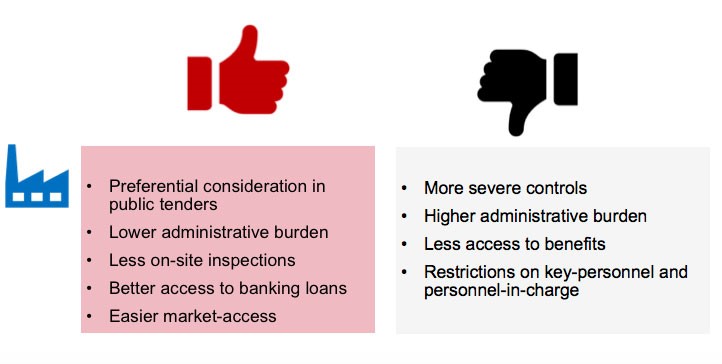
A strong credit score can lead to better borrowing opportunities and favorable interest rates, while a lower score may limit access to credit or result in less favorable terms. Individuals need to monitor and manage their credit scores responsibly to maintain healthy financial profiles and achieve their financial goals.
Credit Agencies in Israel: Credit agencies in Israel play a vital role in assessing individuals’ and businesses’ creditworthiness. These agencies collect, compile, and analyze financial data to generate credit reports and scores that reflect an entity’s credit history, payment behavior, and financial obligations. The main credit agencies in Israel include the Israeli Credit Insurance Company (ICIC), Experian Israel, and Dun & Bradstreet Israel.
These agencies provide lenders, banks, and financial institutions with valuable information for making informed decisions about extending credit, issuing loans, and setting interest rates. Consumers and businesses can also benefit from these credit reports by gaining insights into their financial health and taking steps to improve their credit profiles.
Credit agencies contribute to the transparency and efficiency of the financial system, enabling responsible lending practices and helping individuals and businesses make well-informed credit-related decisions.
The major credit agencies in Israel are as follows:
The Israeli Credit Insurance Company (ICIC): The Israeli Credit Insurance Company, is the leading credit insurer in Israel. ICIC has been ensuring credit since 1957 and today ensures sales totaling over $15 billion annually, in both local and foreign trade transactions.
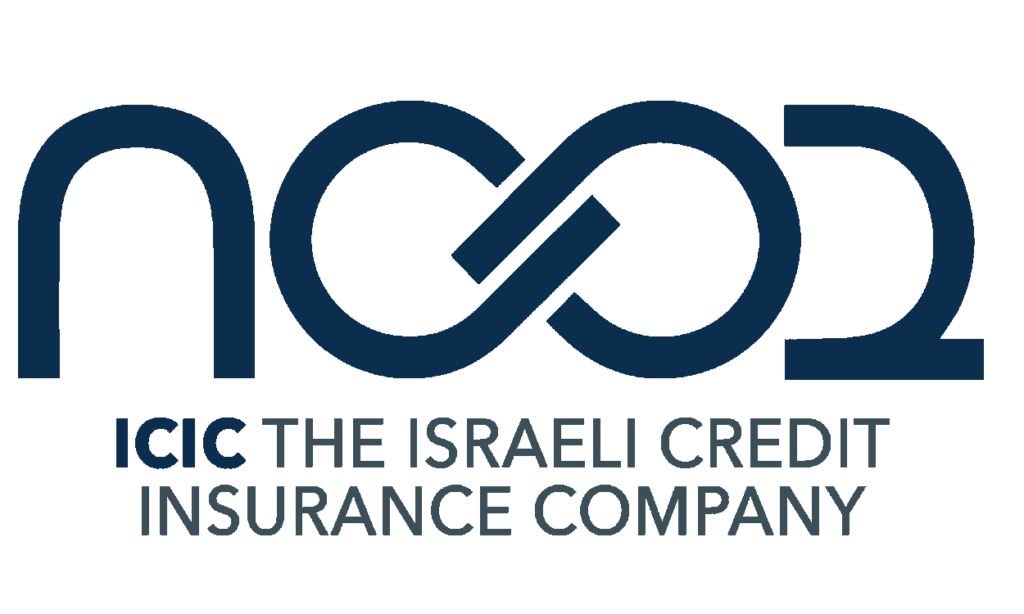
ICIC offers varied and advanced credit insurance services as well as programs assisting in obtaining finance and performance guarantees for both domestic and export purposes. The company type is Credit Insurance and Surety. Our lines of bonds and guarantees are written are Bid bonds, Advance Payment bonds, Performance bonds, and Custom bonds.
ICIC is an equal partnership company, jointly owned by Allianz Trade* – the largest credit insurer in the world, and Harel Insurance Investments and Finances Ltd – one of the largest insurance companies in Israel.
Experian Israel: Experian is a well-known global credit reporting and information services company that operates in various countries, including Israel. Experian provides credit-related information, data analytics, and technology solutions to individuals, businesses, and organizations to help them manage risk, make informed decisions, and improve financial health.
Experian Israel is a branch of Experian, a globally recognized credit reporting company. Experian’s services in Israel are likely to be similar to its services in other countries. Experian compiles credit reports that contain information about an individual’s or business’s credit history, payment behavior, outstanding loans, credit limits, and more.

Experian offers identity verification services to help businesses confirm the identity of individuals during various transactions, such as applying for credit, opening accounts, or conducting online transactions. Experian provides tools and services to detect and prevent fraudulent activities. This can include monitoring credit activity for suspicious behavior and assisting in identity theft prevention.
Experian helps businesses assess risk associated with lending, credit extension, and other financial decisions. This information enables lenders to make informed decisions while managing risk effectively.
Dun & Bradstreet Israel: Dun & Bradstreet is a global provider of business information and analytics, offering services related to business credit reporting, risk management, and commercial data insights. Dun & Bradstreet also operates in Israel, providing businesses with valuable information and insights to assess credit risk, make informed business decisions, and manage relationships with other companies.
Dun & Bradstreet Israel is known for providing business credit information and ratings. With Dun & Bradstreet’s Consumer Credit Report, you can learn about the finances of a private person, subject to the Consumer Credit Law. This law does allow a high level of accessibility to information about individuals’ compliance with their financial obligations.
The information in the Consumer Credit Report is gathered from a variety of bank and state sources. Using it, you can minimize any ambiguity about a potential business partner and avoid entering into any ill-advised business transactions.

Types of Credit Cards
Credit cards are the dominant payment method in Israel, followed by debit cards. Debit cards from Visa or Mastercard are popular among teenagers and are usually co-branded with a local scheme. To buy from international businesses, Israelis need to pay with a Visa or Mastercard, but they don’t use these schemes for domestic payments.
You may have heard that Israeli credit card rewards and perks are just not that exciting relative to cards in many other countries, this is true. Most Israeli credit cards have high fees with close to 0 benefits. That being said, there are some cards here with significant advantages over the standard card issued by your Israeli bank and it may be a good time for an upgrade.

How Credit Card Works: In Israel, the bank offers a range of credit cards to suit your individual needs. Some of the main types of credit cards are:
Visa Credit Card: The most widely accepted credit card brand in the world for its benefits, promotions, and discounts. Visa credit cards are widely used and offered by various financial institutions in Israel, just like in many other parts of the world. Visa is one of the major international payment networks, and its credit cards can come in various types and with different features, depending on the issuing bank or financial institution.
Mastercard Credit Card: Mastercard credit cards come with a range of features, benefits, and rewards tailored to different consumer needs. Mastercard credit cards are available from several major Israeli banks and financial institutions. Bank Hapoalim, Bank Leumi, and Israel Discount Bank are different major banks that offer this card.

Diners Club Credit Card: Diners Club is a well-known international credit card network that offers various credit card products in many countries, including Israel. Diners Club credit cards are known for their unique features and acceptance at a wide range of merchants and establishments.
This credit card allows you to purchase goods and services from merchants, online and over the phone. International and platinum credit cards also allow you to make purchases overseas.

Fly Card Credit Card: This credit card with El Al Matmid frequent flyer club membership offers the best accrual ratio in Israel. Every time you shop, you earn points that bring you closer to your next flights. This card also provides you with cultural promotions from Diners, consumer promotions from YOU club, and Discount Key promotions.
There are two types of cards:
Fly Card: Every time you use the Fly Card credit card, you accrue Matmid frequent flyer points which bring you closer to your next flight with the best accrual ratio: Spend NIS 250 – earn 1 Matmid frequent flyer point.
Fly Card Premium: This card is offered to Silver, Gold, Platinum, and Top Platinum members of the Matmid frequent flyer club and to new Matmid members who commit to monthly spending of NIS 10,000 or more on their credit card.

Sources of Credit Cards in Israel
Credit cards are typically offered by banks, financial institutions, and credit card companies. These sources provide individuals with the opportunity to access credit, make purchases, and manage their finances.
Several major financial institutions in Israel offer credit card services. These institutions include banks and credit card companies that provide a variety of credit card options to cater to different needs and preferences.
Banks: Most banks offer a variety of credit card options to their customers. These cards may come with different features, rewards programs, and interest rates based on the individual’s creditworthiness.
Bank Hapoalim: Bank Hapoalim is one of the largest and most well-known banks in Israel. Established in 1921, it has played a significant role in the country’s financial landscape. They offer a range of credit card options with various features, including rewards, travel benefits, and more.
Bank Hapoalim provides a comprehensive array of financial services, including retail banking, corporate banking, private banking, investment services, asset management, and more. The bank also offers various banking products and services for individuals, including savings and checking accounts, credit cards, personal loans, mortgages, and digital banking solutions.
Bank Leumi: Bank Leumi is another major bank and the oldest banking institution, playing a significant role in the country’s financial sector. It provides a variety of credit card products, from basic cards to cards with rewards and exclusive benefits.
Bank Leumi is the flagship company of the Leumi Group, which encompasses a range of financial and banking services. The group offers various services to individuals, businesses, and institutions.
Bank Leumi provides a wide array of financial services, including retail banking, corporate banking, investment banking, asset management, and more. The bank offers personal banking solutions such as savings accounts, checking accounts, credit cards, personal loans, mortgages, and digital banking services to individuals.
Israel Discount Bank: Israel Discount Bank commonly known as Discount Bank, is one of Israel’s major banking institutions with a long history and a significant presence in the country’s financial sector. It also offers a selection of credit cards with different features, including cashback, points, and discounts.
Discount Bank was founded in 1935 and has since become one of Israel’s largest and most well-established banks. It has played a crucial role in the development of Israel’s economy and financial infrastructure.
Discount Bank offers tailored financial solutions to businesses, including working capital loans, trade finance, treasury services, and commercial real estate financing.
Mizrahi-Tefahot Bank: Mizrahi-Tefahot Bank is commonly known as Mizrahi Bank. It has a significant presence in the country’s financial sector and offers a range of banking and financial services. It also provides credit card choices with various benefits, such as rewards programs and installment payment plans.
Mizrahi-Tefahot Bank was established in 1923 and has since grown to become one of Israel’s major banking institutions. The bank has a rich history and has adapted to the changing financial landscape.
Mizrahi-Tefahot Bank offers financial solutions tailored to the needs of businesses and corporations, including commercial loans, working capital financing, trade finance, and treasury services.
Financial Institutions: American Express (Amex) is a well-known global financial services company that operates in various countries, including Israel. It offers a range of financial products and services, with a focus on credit cards, charge cards, travel services, and more.
American Express provides both credit cards and charge cards to individuals and businesses in Israel. These cards offer various features, benefits, rewards programs, and services tailored to different customer segments.
American Express often offers a rewards program called “Membership Rewards,” where cardholders earn points for their spending, which can be redeemed for various rewards such as travel, merchandise, or statement credits.
Credit Card Companies Various credit card companies and financial institutions offer credit cards to individuals and businesses. These credit card providers offer a range of card options with different features, benefits, rewards, and terms.
Various banks and financial institutions in Israel issue Visa and Mastercard credit cards, each with its own set of benefits and features. Diners Club cards are also available in Israel, offering features like worldwide acceptance, travel benefits, and more. Some retailers and businesses in Israel partner with financial institutions to offer co-branded credit cards with special discounts and rewards for purchases at their stores.
Loan
In Israel, a diverse range of loans cater to the financial needs of individuals, businesses, and organizations. Personal loans offer unsecured financing for various purposes, while mortgage loans fund real estate purchases. Auto loans provide vehicle financing, and student loans support educational pursuits. For businesses, loans such as working capital and equipment financing aid operations.
Israel’s dynamic startup ecosystem benefits from startup loans, and SME loans foster growth for small and medium-sized enterprises. Lines of credit offer flexibility, while overdraft facilities extend short-term funds.
There are several types of loans available in Israel, offered by banks, financial institutions, and credit providers. Some main types that are used in Israel are:

Instant Loan: Instant loans, also known as quick loans or instant cash loans, are a type of short-term borrowing option that provides individuals with fast access to funds for immediate financial needs. In Israel, as in many other countries, instant loans are designed to offer quick approval and disbursement of funds, often within a short period after application. These loans are typically meant to cover unexpected expenses or urgent financial situations.
Instant loans in Israel are characterized by their rapid approval process. Many lenders aim to provide a quick response to loan applications, often within a few hours or even minutes. Most instant loan applications are completed online through the lender’s website or a mobile app. This allows borrowers to submit their applications conveniently from their computers or smartphones.
A loan of up to NIS 75,000 without guarantors and without leaving home: to finance higher education, take a trip abroad, celebrate your child’s bar/bat mitzvah, or any other purpose you may have in mind.
- It is Granted for a period of 2 to 72 months, depending on your needs.
- Given to holders of the credit cards listed in the table
- Penalty-free early repayment
- The loan amount, terms and interest rate are determined according to the type of credit card the loan amount, terms and interest rate are determined according to the type of credit card
Home Renovation Loan: A home renovation loan in Israel is a financial product designed to provide individuals with the funds needed to undertake home improvement or renovation projects. These loans can help homeowners upgrade, renovate, or repair their properties to enhance their living conditions, increase property value, or address maintenance needs.
Home renovation loans are specifically intended for funding home improvement projects, which can range from kitchen and bathroom upgrades to structural repairs and cosmetic enhancements. The loan amount for a home renovation loan depends on factors such as the scope of the renovation, estimated costs, and the lender’s policies. Borrowers can typically borrow up to a certain percentage of the property’s value.
You can renovate your home the way you have always dreamed of. Instead of taking a short-term loan with high monthly repayments. Many banks including Mizrahi Tefahot also offer this type of loan.
Auto Loan: An auto loan in Israel is a type of financing that allows individuals to purchase a vehicle by borrowing funds from a lender. These loans provide borrowers with the necessary funds to buy a new or used car and pay back the loan amount over a specified period, typically through monthly installments.
The loan amount for an auto loan covers the cost of the vehicle, including taxes, fees, and registration expenses. The amount may also include optional add-ons like insurance. Auto loan interest rates can be fixed or variable, depending on the lender and prevailing market conditions. The borrower’s creditworthiness often influences the interest rate offered.
You can easily get a loan for your car in Israel. Auto loan at preferred interest rates for up to as much as 85% of the cost of the car.
All-Purpose Loan: An all-purpose loan in Israel, often referred to as a personal loan or consumer loan, is a type of financing that individuals can use for various purposes. Unlike loans with specific purposes like auto or home loans, all-purpose loans provide borrowers with the flexibility to use the funds for a wide range of needs, such as debt consolidation, travel, medical expenses, home improvements, education, or any other personal expenses.
A special loan in which your home serves as collateral for a loan you can take for any purpose. The loan amount for an all-purpose loan can vary based on the borrower’s income, credit history, and the lender’s policies. It may range from a few thousand shekels to a higher amount.
Interest rates for all-purpose loans can be fixed or variable. The borrower’s creditworthiness and market conditions can influence the interest rate offered.
Student Loan: To give you peace of mind during your academic studies, some banks offer you a loan to finance your tuition fees as well as loans of up to NIS 60,000 with special terms. Student loans in Israel are financial tools designed to help students cover the costs of higher education, including tuition fees, living expenses, books, and other educational necessities. These loans enable individuals to pursue academic studies without shouldering the full financial burden upfront.
In Israel, student loans are often offered by government-backed institutions such as the National Student and Youth Loans Authority (NESAL) and commercial banks. The government provides guarantees for these loans to make them more accessible.
Business Loan: A whole raft of financing solutions, and convenient terms, to help you grow your business, including small-business loans from a state-guaranteed fund, and a factoring service that turns your customer’s debt into cash. Major banks in Israel offer Business Loan for you.
A business loan in Israel is a financial product designed to provide funding to businesses for various purposes, such as expansion, working capital, equipment purchases, inventory management, and other business-related needs. Business loans enable companies to access capital to support growth, operations, and development. The loan amount for a business loan in Israel can vary based on the lender, the type of business, and the specific purpose of the loan. It could range from a few thousand shekels to a substantial amount.
Israel Education System
- Overview of Israel’s Education System
- Structure of Israel’s School System
- Types of School
- Enrollment in School
Overview of Israel’s Education System:
The State of Israel is a relatively young country that formed in 1948, following a declaration of independence that realized the long-standing desire to create a ‘homeland for the Jewish people’. Israel is a parliamentary democracy with a president as head of state.
Israel is a country of immigrants, with inhabitants from over 80 countries. This has resulted in a variety of population groups, with great diversity in ethnic and cultural backgrounds and religious beliefs. Approximately 76% of the population is Jewish, 20% Arab (Muslims and Christians) and the remaining 4% are Druze, Christians, and other groups.
The Israeli education system is governed by national laws that are implemented by the Ministry of Education, Culture, and Sport. The most important legislation governing primary and secondary education dates from 1949 and 1953, and from 1958 for higher education.
Since 1949, public education has been compulsory and free for children aged between 3 and 15 (until grade 10). A legislative change extending the age for compulsory education to the 11th and 12th year of secondary school is gradually being introduced. Educational legislation prohibits discrimination based on ethnic origin.
Ministry of Education: The Ministry of Education is a government agency responsible for overseeing and regulating the country’s education system. It is responsible for educational institutions, including kindergartens, schools, higher education, and non-formal education in Israel. Its primary mission is to provide quality education to Israeli citizens from preschool through higher education levels.
The ministry’s activities focus on legislation and planning education services, licensing professionals in the field of education and teaching. It is the branch of the Israeli government charged with overseeing public education institutions in Israel. The ministry has previously included culture and sport, although this is now covered by the Ministry of Culture and Sport.
The ministry oversees the preschool and elementary education system, ensuring that young learners receive a solid foundation for their educational journey. The ministry is involved in developing and updating the national curriculum, ensuring that it meets the needs of students, prepares them for the future, and reflects the values of Israeli society.

Structure of Israel’s Education System
Israel’s education system is structured to provide comprehensive and accessible learning opportunities to its citizens from a young age through adulthood. The system encompasses various levels, each with its unique characteristics and objectives. The well-structured education system aims to equip individuals with the knowledge and skills needed to contribute effectively to Israeli society and the global community.
The national education system of Israel consists of 5 levels: pre-primary, primary, secondary, post-secondary, and higher education. It is divided into 6 years of primary education (grades 1-6), 3 years of lower-secondary education (grades 7- 9) and 3 years of upper-secondary education (grades 10-12).
There are separate schools for the Jewish and Arab communities, however, there are Arab pupils who attend Jewish schools. In Israel, there is no clear distinction between academic education and higher professional education. Some programs contain elements of both higher professional education and university education.
The language of education is either Hebrew or Arabic; the primary/secondary school year runs from the end of August until June, and the academic year from October until June.
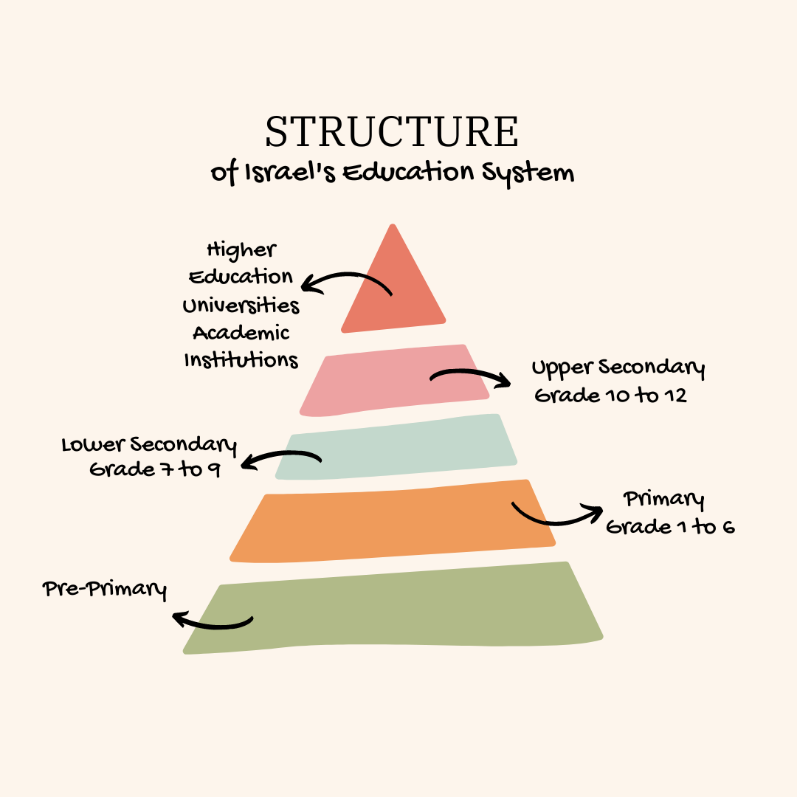
Pre-Primary Education: Education commences at a young age so that children can get a head start. The emphasis is on socialization skills and the development of language. 2 as well as 3 to 4-year old in Israel attend some form of preschool. Preschools are sponsored by Israeli local authorities.
Daycare Centers: (Talmudei Tora) These centers provide care and early childhood education for children from infancy to around age three.
Pre-Schools: Preschools are for children aged three to six, Preschools focus on early childhood education, socialization, and development.

Primary Education: Primary education in Israel consists of a compulsory pre-primary period (kindergarten) for children aged 3-6, followed by 6 years of primary school (until age 12). Primary education is given in schools for the Jewish and Arab communities and focuses on basic subjects such as Hebrew, mathematics, science, social studies, and English. Students also study Jewish studies, including Torah and Hebrew literature.
Lower Secondary Education: Grades 7 to 9 constitute lower secondary education, where students continue studying core subjects while also having the option to choose elective courses. The 3 years of lower secondary education consist of general subjects, including Hebrew language and literature, English, Arabic, French, mathematics, science, history, geography, social studies, religious studies, and physical education.
After completing grade 9, pupils continue to one of the two upper-secondary education tracks. The type of upper secondary education attended by pupils is determined in part by their results from grades 7-9. No diploma is issued at the end of grade 9.
Upper Secondary Education: Grades 10 to 12 are the final years of secondary education. Students prepare for matriculation exams (Bagrut) that are crucial for university admissions. Regardless of the track chosen, all pupils must satisfy the requirements of the core curriculum, the general components of which are set by the Ministry of Education. It offers more space for additional and specialist subjects outside the core curriculum, depending on students’ ambitions and aptitude.
Bagrut Exams: Bagrut exams are taken at the end of grade 12 and are a prerequisite for higher education, They test the knowledge accumulated throughout the whole of secondary school, and are designed and assessed by the Ministry of Education. The Bagrut is mandatory for admission to higher education.
The level of Bagrut exams is expressed in terms of units, with a range from 1 (least difficult) to 5 (most difficult). Pupils take examinations in several compulsory core subjects, as well as in an elective or electives.
Higher Education: Access to higher education requires a Bagrut. However, this diploma only fulfills the basic requirements. Higher education in Israel is the responsibility of the Council for Higher Education or CHE. Higher education includes both undergraduate and graduate programs, and is provided by institutions that are divided into 4 categories by the CHE:
- Universities
- Academic Institutions
- Academic Colleges for Education
- Academic Programs in Colleges under the Academic Auspices of Universities
Institutions in all 4 of the above categories can offer academic education and higher professional education. Most programs offered by universities count as academic programs, however, it is also possible to complete studies in areas such as social work and the paramedic fields.

Types of Schools
Israel’s education system offers a diverse array of school types to cater to the varied needs and preferences of its population. These school types encompass different educational approaches, curricula, and focuses. Public schools, known as “malachite” schools, provide a standardized curriculum and are attended by the majority of students. Private schools, including religious schools and those following alternative educational philosophies, offer specialized approaches to learning.
Various religious-affiliated schools cater to different religious communities, such as Jewish, Muslim, Christian, and Druze schools. Additionally, there are schools for special education, addressing the needs of students with disabilities or learning differences. International schools offer curricula in languages other than Hebrew, often catering to expatriate communities. Technical and vocational schools provide hands-on training for practical skills, while agricultural and arts-oriented schools focus on specialized areas.
Israel has various types of schools that cater to different educational needs and approaches. Here are some major types of schools in Israel:
State Schools: State schools in Israel, known as “malachite” schools, form the backbone of the country’s education system. These publicly funded institutions provide education to the majority of students and are overseen by the Ministry of Education. State schools are funded and operated by the government. They follow the national curriculum and provide education to a wide range of students. These are attended by a major percentage of the pupils.
The primary goal of state schools is to provide students with a well-rounded education that promotes academic excellence, critical thinking, and a strong foundation for future studies. While state schools offer a uniform curriculum, they still allow for some flexibility in teaching methods and extracurricular activities. The diversity of students in state schools reflects Israel’s multicultural society, fostering an environment where students from various backgrounds learn and interact together.
Public State schools include:
- the secular schools, that offer the state-education curriculum in Hebrew asset by the Ministry of Education;
- the orthodox schools, that offer state-religious education in Hebrew, with greater attention devoted to religion and Jewish culture in combination with the national curriculum; and
- the Arab schools, that offer the state curriculum in Arabic, in combination with a greater focus on Arab history, culture, and beliefs.
State-Religious Schools: State-religious schools in Israel, often referred to as “malachite dati” schools, are a significant component of the country’s education system. These institutions offer an integration of secular and religious education, catering to students who wish to receive both a strong academic foundation and a deep understanding of their religious heritage.
State-religious schools integrate both secular and religious education. They follow the national curriculum while incorporating religious studies, Hebrew language, and Jewish traditions into their educational framework. These schools often emphasize the importance of Torah study and values from Jewish tradition alongside general studies. State-religious schools aim to cultivate students who are not only academically proficient but also grounded in their faith and cultural identity.
Arab Schools: Arab schools in Israel play a crucial role in providing education to the Arab minority population, contributing to cultural preservation, identity, and equal opportunities in the education system. These schools cater to Arab students, offering instruction primarily in Arabic and emphasizing Arab history, culture, and language alongside standard curriculum subjects.
Arab schools provide an educational environment that fosters a sense of community and belonging for Arab students, allowing them to explore their heritage while also preparing for future academic pursuits. While some Arab schools are part of the state education system, there are also recognized independent Arab schools. These schools, whether public or independent, serve as important centers for cultural expression and social cohesion within the Arab minority community in Israel.
Arab schools offer education primarily to the Arab minority population in Israel. These schools provide instruction in Arabic and include cultural components important to Arab students. Hand in Hand is one of the famous Arab schools in Israel.
Private Schools: Private schools in Israel offer an alternative educational pathway outside of the public education system. These institutions provide diverse educational approaches, curricula, and philosophies, catering to a range of student needs and preferences. Private schools can be secular or religious, offering specialized programs that align with specific cultural, religious, or pedagogical values.
While private schools often require tuition fees, they provide flexibility in curriculum design, teaching methods, and extracurricular activities. Many private schools in Israel aim to create unique learning environments that encourage critical thinking, creativity, and personalized learning experiences.
The public is free while these private schools are quite expensive to public schools. Jerusalem American International School (JAIS), Anglican International School Jerusalem (AISJ), and Saint George School are some top private schools in Israel. These schools are also called International Schools.
Special Education Schools: Special education schools in Israel play a vital role in providing tailored education and support for students with disabilities and special learning needs. These schools are dedicated to creating inclusive and accommodating environments where students can thrive academically, socially, and emotionally. Special education schools offer individualized instruction, adaptive curricula, and a range of services, such as speech therapy, occupational therapy, and counseling, to address the unique needs of each student. These institutions aim to empower students with disabilities to reach their full potential, fostering their independence and enhancing their quality of life.
These schools provide specialized education and support for students with disabilities and special needs, ensuring they have equal access to quality education. Some famous top Special Education Schools include Nefesh B’ Nefesh, Nitzan-Israel, and Beit Issie Shapiro.
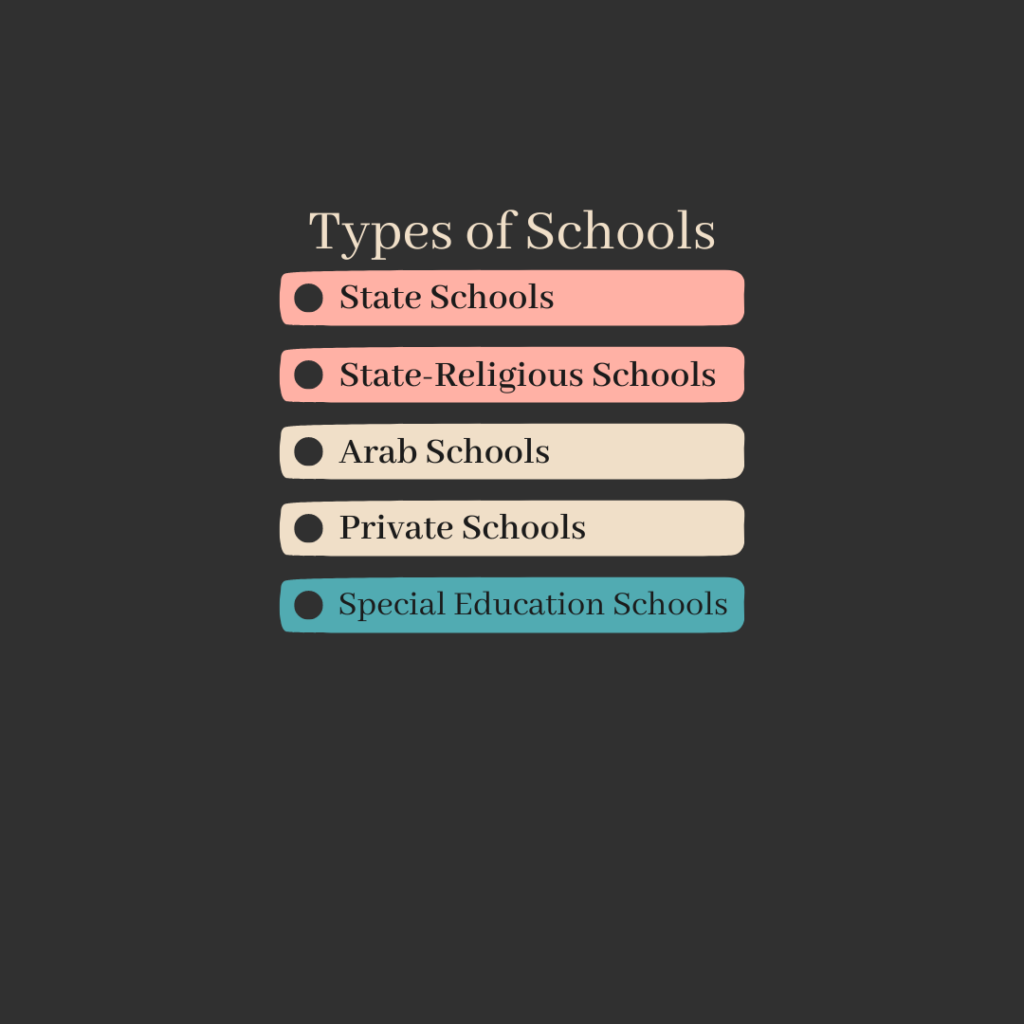
Enrollment in School
Enrollment in schools in Israel typically follows a structured process, which may vary based on the type of school and the educational level. Choosing a school for your child is one of the most significant decisions that needs to be made in this process. Understanding the way, the school system works in Israel will help you make a quality decision.
In Israel, all schools are under the supervision of the local Machleket HaChinuch (Department of Education). Therefore, registration is more of a bureaucratic process than in North America or the UK.
Every student who lives in Jerusalem is eligible to register in the city’s elementary schools. The registration will be conducted on the municipal website by the law and the directives of the director-general of the Education Ministry. According to the regulations of the Education Ministry, there will be 34 students in each class, and every school has a defined capacity by the building’s characteristics.
If the event of excess demand, a lottery will be held based on the following preferences:
- Children from the Youth Division (if there is a Youth Division in the school)
- Residents living near the school
- Those with older siblings attending the school in the relevant school year
- Exceptional cases
- All other students residing in Jerusalem
- Students living outside the city
Pre-Primary and Primary Schools: Enrollment for preschools and primary schools usually takes place during the year before the child is expected to start. Parents need to visit the chosen school to obtain enrollment information, submit required documents, and complete any necessary forms.
Documents typically required include the child’s birth certificate, health records, and parental identification. Some schools may require an entrance interview or assessment.
Secondary Schools: Enrollment for secondary schools often occurs in the middle of the school year before the student is set to enter the new level. Schools might require the student’s previous academic records and sometimes conduct an interview or assessment.
Bagrut Exams and Higher Education: For students preparing to take the Bagrut exams (matriculation exams) in grade 12, schools provide information about exam schedules, subjects, and registration procedures. Enrollment in higher education institutions, such as universities and colleges, usually involves an application process that includes submitting academic records, exam scores, and sometimes personal statements.
Language Requirements: Depending on the school and the language of instruction, students may need to demonstrate proficiency in Hebrew or another language.
It’s important to note that specific enrollment procedures and requirements can vary between different schools, regions, and educational levels. To enroll in a school in Israel, it’s recommended to contact the chosen school directly to inquire about their specific enrollment process, required documents, and any deadlines.
Israel’s Health Care System
- Overview of Israel Health Care System
- National Health Insurance (NHI)
- Health Care Provider in Israel
- Components of Israel’s Health Insurance
- Understanding Your Health Insurance
- Types of Health Insurance
- Health Care Regulation
Overview of Israel Health Care System
The healthcare system in Israel is characterized by its universal coverage, emphasis on preventive care, and comprehensive services. The country’s healthcare system is largely publicly funded and provides accessible medical services to all Israeli citizens and permanent residents. Managed by the Ministry of Health, Israel’s healthcare system offers a wide range of medical services, including primary care, specialized treatments, hospital care, and emergency services.
Citizens are required to enroll in one of several health maintenance organizations (HMOs), known as “Kupot Holim,” which serve as the primary points of access to healthcare services. These HMOs provide various medical services, from general practitioner visits to prescription medications and preventive screenings. Additionally, advanced medical research and technology are integral parts of the system, contributing to the high standard of care available to patients. Overall, Israel’s healthcare system strives to provide quality medical care, promote public health, and ensure equal access to healthcare services for all its residents.
Every resident of Israel is insured for healthcare under the National Health Insurance Law, through payment of monthly premiums to the National Insurance Institute. Under the State Health Insurance Law, effective from January 1, 1995, every Israeli resident has health insurance coverage. Residents choose from four competing nonprofit health plans that provide a mandated benefit package, including hospital, primary, specialty, mental health, and maternity care, as well as prescription drugs and other services.
There are no deductibles, but some cost-sharing is required for specialist visits and prescription drugs. The compulsory insurance system is funded primarily through a national income tax and an income-related health tax. Most citizens also purchase voluntary health insurance for medications not covered by the benefit package and for faster access and greater provider choice. Almost all governmental health functions are organized by the Ministry of Health, which has regional and district health offices.
National Health Insurance (NHI)
Israel’s National Health Insurance (NHI) system is a cornerstone of the country’s healthcare system, providing comprehensive medical coverage to all citizens and permanent residents. Since 1995, Israel’s National Health Insurance (NHI) law has ensured universal coverage for citizens and permanent residents. As the law states, “Health insurance shall be based on principles of justice, equality, and mutual assistance.” Under this commitment, every resident is entitled to health care services. While residents also have the right to receive services at a reasonable quality level, within a reasonable period, and at a reasonable distance from their home, no formal definition of “reasonable” exists, and there is no penalty for health plans that fail to comply.
Under the NHI, citizens and residents are required to join one of several health maintenance organizations (HMOs), known as “Kupot Holim.” These HMOs offer a wide range of medical services, from primary care and specialist consultations to hospital treatments and medications. NHI membership grants individuals access to a comprehensive package of healthcare services, including preventive care, diagnostic tests, surgeries, and emergency treatments.
To fund the NHI system, Israeli citizens and employers contribute through payroll taxes, ensuring a sustainable and equitable healthcare financing model. The NHI system embodies Israel’s commitment to providing universal healthcare coverage and promoting the well-being of its population through accessible and quality medical services.

Services Covered in NHI: The mandated NHI benefit package includes the following:
- Hospital Care
- Primary and Specialty Care
- Prescription Drugs
- Certain Preventive Services
- Mental Health Care
- Dental Care for Children and the Elderly Aged 75+
- Diagnostic Exams
- Maternity Care
- Allied Medical Care (physiotherapy, occupational therapy, nutrition, speech therapy)
Government Role in Health Insurance: The national government, through the Ministry of Health, is responsible for population health and the overall functioning of the health care system. The Ministry of Health is responsible for formulating healthcare policies, setting standards, and supervising the implementation of the National Health Insurance (NHI) system. The government ensures that the NHI system remains efficient and accessible by working closely with health maintenance organizations (HMOs) and healthcare providers. It supervises and works with the NHI health plans and owns and operates a large network of maternal and child health centers, about half of the nation’s acute care bed capacity, and about 80 percent of its psychiatric bed capacity.
The government also allocates public funding to support the NHI system, allowing it to provide financial resources for medical treatments, research, and advancements in healthcare technology. Through its oversight and coordination efforts, the Israeli government actively contributes to the overall success of the health insurance system, reinforcing its commitment to the well-being of its citizens and the equitable distribution of healthcare services.
Local governments have limited involvement in health care provision. Accordingly, nearly all governmental health functions are organized by the national Ministry of Health, which comprises a network of regional and district health offices.
Eligibility for Israeli Healthcare: All Israeli citizens and official residents have a legal right to health care in Israel. New immigrants who already have immigration visas are eligible for Kupat Cholim cover immediately, too.
Foreigners in Israel for more than a short visit can sign up for a non-resident program with Kupat Cholim. Monthly fees for adult individuals range from $115 to $450, depending on your age – very similar to many travel medical insurance programs.
Health Care Provider in Israel
Healthcare providers in Israel constitute a diverse network of medical professionals, institutions, and organizations dedicated to delivering comprehensive medical care to the population. These providers range from public and private hospitals to clinics, specialized treatment centers, and primary care facilities.
Healthcare services are provided by a network of Health Maintenance Organizations (HMOs), also known as “Kupot Holim.” These HMOs offer a range of medical services, including primary care, specialist care, hospitalization, prescription medications, and more.
Voluntary health insurance financed 14 percent of national health expenditures in 2016. Residents can obtain voluntary health insurance from the four NHI nonprofit plans Health Maintenance Organizations HMOs.
Commercial private plans tend to be more comprehensive, more individually tailored, and more expensive and can be purchased by individuals or groups, such as employers, unions, or kibbutzim.

Kupat Holim Clalit: Clalit is the largest and one of the oldest HMOs in Israel, serving over half of the population. Established in 1911, Clalit has since grown to become a cornerstone of the Israeli healthcare system, serving millions of members across the country. As a central participant in the National Health Insurance (NHI) system, Clalit offers a wide range of medical services, including primary care, specialist consultations, hospital treatments, medications, and preventive health programs.
With an extensive network of medical professionals, clinics, hospitals, and specialized facilities, Clalit aims to provide accessible and quality healthcare to its members. The organization places a strong emphasis on preventive care, health promotion, and community engagement. Clalit’s comprehensive approach to healthcare, coupled with its commitment to innovation and research, underscores its significant role in shaping Israel’s healthcare landscape and ensuring the well-being of its members.

Kupat Holim Maccabi: Maccabi is another prominent HMO in Israel, offering comprehensive healthcare services to its members. It is renowned for its extensive healthcare services and commitment to the well-being of its members. It operates a network of clinics, medical centers, hospitals, and specialists.
Established in 1940, Maccabi has grown to become one of the leading providers of healthcare in the country. Maccabi is an integral part of Israel’s National Health Insurance (NHI) system, offering a comprehensive range of medical services that encompass primary care, specialist consultations, hospital treatments, medications, and preventive health initiatives. Maccabi places a strong emphasis on leveraging technology to enhance healthcare services and offers innovative telemedicine options for consultations and support. The organization’s dedication to promoting health awareness and encouraging a healthy lifestyle further highlights its commitment to the well-being of its members. Maccabi’s role in providing comprehensive healthcare services and fostering a culture of wellness makes it a vital contributor to Israel’s healthcare landscape.

Kupat Holim Leumit: Leumit, founded in 1933, is one of the HMO options available to residents of Israel. Leumit offers a variety of medical facilities and clinics throughout the country. As one of the country’s major healthcare providers, Leumit is an integral part of the National Health Insurance (NHI) system, offering a comprehensive array of medical services to its members. Leumit’s services encompass primary care, specialist consultations, hospital treatments, medications, and preventive health programs.
Leumit emphasizes community involvement and wellness promotion, striving to provide holistic healthcare solutions that address the physical, mental, and preventive aspects of well-being. By leveraging technological advancements and fostering a patient-centered approach, Kupat Holim Leumit continues to contribute significantly to Israel’s healthcare landscape, providing essential medical care and services to a diverse and growing population.

Kupat Holim Meuhedet: Meuhedet holds a prominent position within Israel’s healthcare system. It is known for its emphasis on family-oriented care and preventive health services. It offers primary care, specialist care, hospitalization, and more. Meuhedet also provides specialized services for women, children, and the elderly.
Established in 1974, Meuhedet is a respected health maintenance organization (HMO) that operates as an essential component of the National Health Insurance (NHI) system. Meuhedet provides a wide range of medical services, including primary care, specialist consultations, hospital treatments, prescription medications, and preventive health programs.
With an extensive network of healthcare professionals, clinics, and medical facilities, Meuhedet ensures that its members have ready access to necessary healthcare resources. The organization is dedicated to promoting health awareness and encourages its members to adopt healthy lifestyles. By serving its members with compassion and expertise, Kupat Holim Meuhedet actively contributes to the overall well-being of Israel’s population and reinforces the importance of accessible and quality healthcare

Components of Israel’s Health Insurance
Israel’s health insurance system comprises several interconnected components that ensure comprehensive and accessible healthcare coverage for its citizens and residents. These components ensure that individuals have access to a wide range of healthcare services, from preventive care to specialized treatments. Here is the breakdown of the components:
Health Maintenance Organizations (HMOs): Health Maintenance Organizations (HMOs), referred to as “Kupot Holim” in Hebrew, are a fundamental component of Israel’s healthcare system. These organizations play a vital role in providing comprehensive medical coverage and services to the population. Individuals in Israel are required to enroll in an HMO, and each HMO serves as the primary healthcare provider for its members.
HMOs are the primary source of medical care for their members. They offer a broad spectrum of healthcare services, ranging from routine check-ups and preventive care to specialized treatments and hospital care. Individuals have the freedom to choose an HMO based on their preferences and location. The chosen HMO becomes the gateway to accessing healthcare services and medical professionals.

National Health Insurance (NHI): National Health Insurance (NHI) in Israel refers to the universal healthcare coverage system that provides essential medical services to all citizens and permanent residents. Established in 1995, the NHI system ensures that individuals have access to a standard package of medical services, regardless of their financial status. You can check in detail in the upper section.
Pharmaceutical Benefits: Health insurance in Israel includes coverage for prescription medications, with varying levels of co-payment depending on the medication and the member’s age and medical condition. As part of the National Health Insurance (NHI) system, Israeli citizens and permanent residents enjoy coverage for a wide range of medications, enabling them to manage acute and chronic health conditions.
While the NHI system covers many prescription drugs, there may be co-payments associated with certain medications, which can vary based on factors such as the type of medication, the patient’s age, and medical condition. This system of pharmaceutical benefits helps alleviate the financial burden of necessary medications, ensuring that individuals receive the treatments they need without facing excessive costs.
Primary Care: MOs offer primary care services through family doctors, pediatricians, and general practitioners. These primary care providers serve as the first point of contact for medical needs and referrals to specialists. Delivered by family doctors, general practitioners, and pediatricians, primary care focuses on preventive, diagnostic, and basic medical needs. Primary care providers in Israel are typically affiliated with Health Maintenance Organizations (HMOs).
Primary care emphasizes building doctor-patient relationships and promoting holistic well-being by addressing physical, emotional, and preventive aspects of health. The accessibility and comprehensive approach to primary care contribute significantly to Israel’s healthcare system, ensuring that individuals receive timely and appropriate medical attention for various health concerns.
Emergency Care: Emergency medical care is available to all members through HMOs and hospital emergency departments, ensuring that individuals can receive immediate medical attention in case of emergencies. Emergency care is provided through a network of hospitals, medical centers, and specialized emergency departments. In cases of sudden illness, accidents, injuries, or other medical emergencies, individuals can access immediate medical assistance by visiting the nearest hospital’s emergency department.
Community and Public Health Initiatives: HMOs and the Ministry of Health collaborate on community health programs, health promotion campaigns, and disease prevention efforts to improve the overall health of the population. These initiatives encompass a wide range of programs and activities aimed at improving public health awareness, preventive care, and overall quality of life.
These initiatives address a diverse range of health topics, including nutrition, physical activity, smoking cessation, mental health, and disease prevention. By engaging with local communities, these programs encourage healthier lifestyles and empower individuals to make informed health choices.
Understanding Your Health Insurance
Health insurance coverage in Israel is provided through the National Health Insurance Law. This law establishes a mandatory health insurance system that ensures all Israeli citizens have access to essential medical services.
Basic Services: The basic health insurance coverage includes essential medical services and treatments. This means that individuals are entitled to receive medical care for a wide range of conditions without significant out-of-pocket expenses. The coverage varies slightly between the different HMOs, but they all provide a comprehensive package of essential medical services.
Preventive care measures, such as vaccinations and screenings, are also included, aiming to promote overall well-being and early disease detection. The basic coverage ensures that citizens receive necessary medical attention without incurring substantial financial burdens, contributing to a robust and equitable healthcare system that prioritizes the health of all members of society.
Healthcare Costs: While basic medical services are covered, patients might still be required to pay nominal co-payments for some services, such as doctor visits and prescription medications. These co-payments are relatively low and are intended to help manage the healthcare system’s costs. These co-payments are intentionally kept at reasonable levels to help manage the healthcare system’s expenses while ensuring that individuals can access the care they need without undue financial strain. This approach fosters a balance between sustainable healthcare funding and equitable access to medical services, upholding the core principle of providing quality healthcare to all residents of Israel.
Emergency Care: Emergency medical care is provided to all individuals in Israel, regardless of their insurance status. If you require emergency medical attention, you will receive treatment regardless of whether you have health insurance coverage. This approach emphasizes the value of preserving life and well-being above all else. Whether an individual holds basic health insurance, supplementary coverage, or no insurance at all, emergency medical care remains accessible. This inclusive system underscores Israel’s commitment to prioritizing human life and ensuring that no one is denied essential medical treatment during urgent situations.
Supplementary Insurance: In addition to mandatory health insurance, individuals can also opt for supplementary health insurance, which is offered by various insurance companies in Israel. This supplementary insurance can cover additional services not included in the basic coverage, such as private hospital rooms, access to specific specialists, and more. This additional coverage, offered by various private insurance companies, can include a range of benefits such as access to private hospital rooms, expedited appointments with specialized doctors, coverage for elective surgeries, alternative medicine treatments, and more.
It provides a layer of flexibility and choice in healthcare, catering to those who seek personalized medical attention and a higher level of convenience. However, it’s important to note that while supplementary insurance can provide valuable extras, it’s not a replacement for the core services provided by mandatory health insurance, and individuals should carefully consider their options based on their healthcare requirements and financial considerations.
Types of Health Insurance
In Israel, the healthcare system encompasses two main types of health insurance to ensure comprehensive coverage for its residents. The first type is mandatory basic health insurance, which is provided under the National Health Insurance Law. Through this system, all Israeli citizens are entitled to essential medical services, including doctor visits, hospitalization, surgeries, prescription medications, and preventive care.
The second type is supplementary health insurance, which is optional and can be obtained from private insurance companies. This supplementary coverage allows individuals to customize their healthcare by adding extra benefits such as access to private hospital rooms, specialized treatments, and other amenities.
Mandatory Basic Health Insurance: Under the National Health Insurance Law, all Israeli residents are required to have mandatory basic health insurance. Basic health insurance includes essential medical services such as doctor visits, hospitalization, surgeries, prescription medications, preventive care, and more. While co-payments may apply to some services, this coverage ensures that all citizens have access to crucial healthcare services.
This coverage ensures that all individuals have equitable access to essential healthcare services, regardless of their financial situation. While nominal co-payments might apply to certain services, the emphasis is on providing quality medical care without imposing excessive financial burdens. Mandatory Basic Health Insurance embodies Israel’s commitment to prioritizing the health and well-being of its citizens, forming the cornerstone of a robust and inclusive healthcare system.
Supplementary Health Insurance: Supplementary health insurance is optional and can be purchased from various private insurance companies in Israel. This type of insurance allows individuals to enhance their healthcare coverage beyond what is provided by mandatory basic insurance. Supplementary insurance can offer benefits such as access to private hospital rooms, faster appointments with specialists, coverage for elective procedures, alternative medicine treatments, and more. It provides a level of customization for individuals who desire additional services or a higher level of convenience.
It’s important to note that while basic health insurance covers essential medical services, including emergency care, supplementary insurance focuses on offering extra benefits and conveniences. Individuals should carefully consider their healthcare needs and preferences when deciding whether to opt for supplementary health insurance, as it’s not a replacement for the mandatory basic coverage. The combination of these two types of insurance contributes to a comprehensive healthcare system that aims to provide accessible and quality medical services to all residents of Israel.
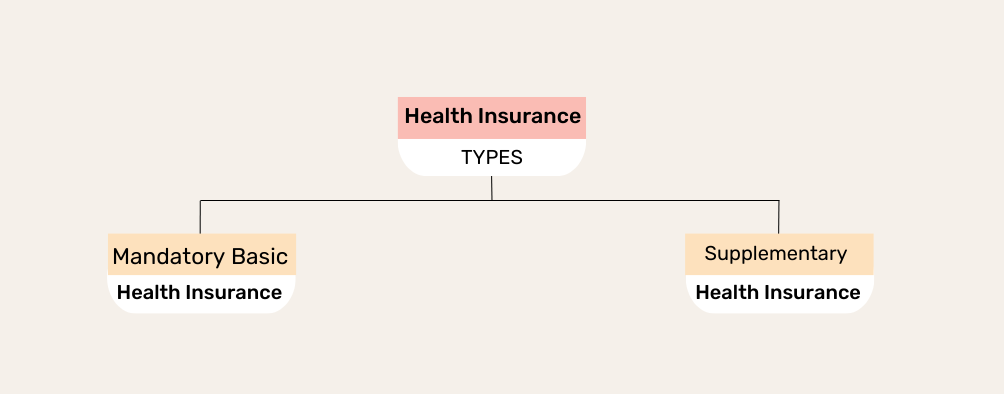
Health Care Regulation
Healthcare regulation in Israel is governed by a comprehensive framework of laws, policies, and institutions designed to ensure the provision of high-quality medical services and safeguard patient rights. At the heart of this system is the National Health Insurance Law, which mandates basic health insurance coverage for all residents. Licensing and accreditation standards are rigorously enforced to uphold the quality of healthcare facilities and practitioners. Patient rights are protected through legislation that emphasizes informed consent, privacy, and access to medical information.
Pharmaceutical regulation guarantees the safety and efficacy of medications, and medical ethics guidelines promote patient welfare and autonomy. Israel’s healthcare regulation reflects its commitment to providing accessible, ethical, and high-standard medical care for its population.
Ministry of Health: The Israeli Ministry of Health is the governmental body responsible for overseeing the country’s healthcare system. It sets healthcare policies, regulates medical standards, and ensures the safety and quality of medical services. Tasked with formulating healthcare policies, enforcing medical standards, and ensuring the well-being of the population, the Ministry plays a crucial role in maintaining the quality and accessibility of healthcare services.
By setting and monitoring standards for medical facilities, practitioners, and pharmaceutical products, the Ministry safeguards patient safety and upholds the integrity of the healthcare infrastructure. Moreover, the Ministry of Health is integral in responding to public health challenges, disease outbreaks, and emergencies, working collaboratively with other governmental bodies, healthcare providers, and stakeholders to address health concerns effectively.
Licensing and Accreditation: Healthcare providers, including hospitals, clinics, and medical professionals, must meet certain licensing and accreditation standards set by the Ministry of Health. This ensures that healthcare facilities maintain appropriate infrastructure, equipment, and quality of care. Regulatory bodies and authorities, often overseen by the Ministry of Health, set stringent standards that insurance providers must meet to obtain licenses. These standards encompass various aspects, including financial stability, transparency, and adherence to ethical practices. Accreditation processes evaluate insurers’ ability to fulfill their obligations to policyholders and assess their capacity to manage risk effectively.
Through licensing and accreditation, Israel’s healthcare insurance sector aims to establish a dependable foundation, inspiring public trust and confidence in the insurance services offered. This framework fosters a healthcare insurance environment characterized by integrity, accountability, and the assurance of equitable and dependable coverage for the well-being of all individuals.
Patient Rights: Patient rights form a fundamental pillar of healthcare insurance in Israel, embodying principles of respect, autonomy, and dignity. Through a robust legal framework and ethical considerations, Israel ensures that individuals are empowered to make informed decisions about their healthcare coverage and treatment options.
Patients have the right to give or withhold consent for medical procedures and treatments, and they are entitled to fair treatment and non-discrimination in their interactions with insurance providers. Israel’s commitment to patient rights not only empowers individuals but also contributes to a healthcare system that values the welfare and autonomy of each policyholder, fostering a foundation of trust and accountability within the insurance landscape.
Pharmaceutical Regulation: Pharmaceutical regulation in Israel is a crucial aspect of the healthcare insurance landscape, contributing to the safety, efficacy, and accessibility of medications. The oversight of pharmaceutical products is primarily carried out by the Ministry of Health, which ensures that medications available in the market meet stringent standards of quality and reliability.
The regulatory process involves thorough evaluation, including clinical trials and scientific assessment, before a drug is approved for use. This meticulous scrutiny guarantees that patients receive medications that are both safe and effective for their intended purposes. Moreover, pricing and reimbursement policies are often implemented to ensure that essential medications are accessible and affordable to the public.
Medical Ethics: Medical ethics within the context of healthcare insurance in Israel embody a set of moral principles that guide the behavior and decisions of healthcare professionals, insurance providers, and policyholders alike. Rooted in the respect for human dignity, patient autonomy, and the pursuit of the highest standard of care, medical ethics ensure that all individuals involved in the healthcare process uphold the values of transparency, honesty, and compassion.
Medical ethics in Israel are guided by principles similar to those in other developed countries. The Israel Medical Association provides ethical guidelines for medical professionals, ensuring that patient welfare and autonomy are respected.
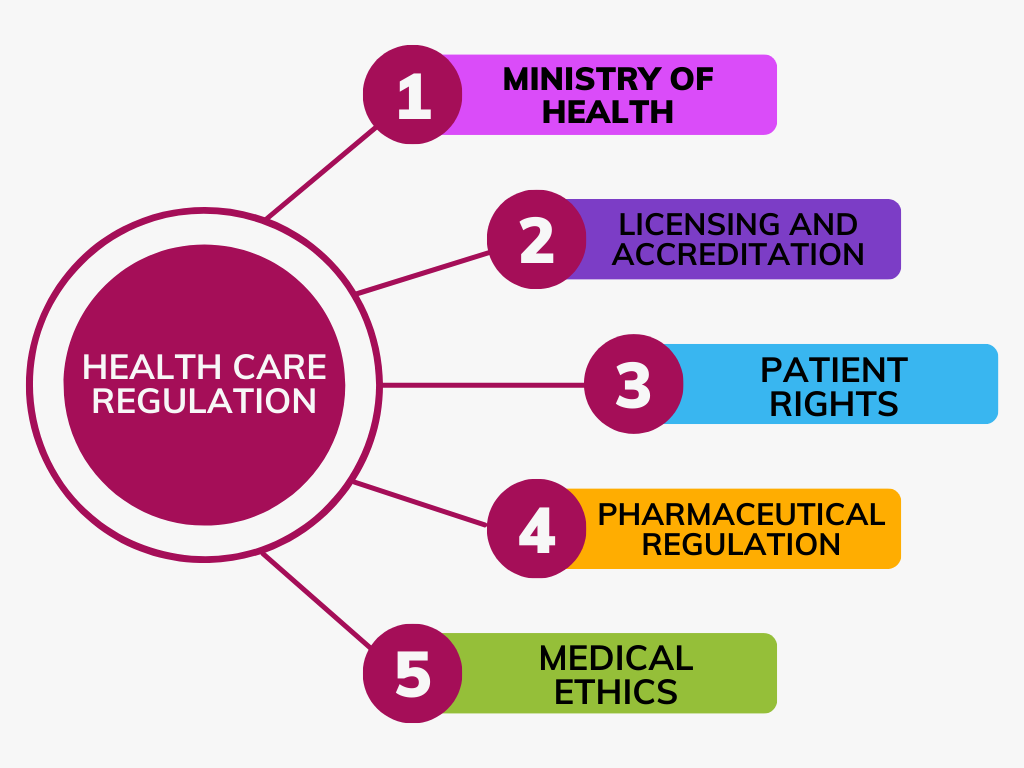
Israel Insurance System
- Overview of the Israel Insurance System
- Types of Insurance in Israel
- Health Insurance and its Types
- Vehicle Insurance and its Types
- Property Insurance and its Components
- Travel Insurance and its Coverage
- Life Insurance and its Types
- Government Insurance Programs
Overview of the Israel Insurance System
The insurance system in Israel comprises a multifaceted framework designed to provide individuals and businesses with a range of financial protections. Covering diverse aspects of life, this system includes health insurance, mandatory vehicle insurance, property insurance, travel insurance, life insurance, business insurance, liability insurance, and supplementary health insurance. The centerpiece of the system is the mandatory health insurance established by the National Health Insurance Law, ensuring that all residents have access to essential medical services through health maintenance organizations (HMOs).

Furthermore, insurance options extend to safeguarding vehicles, properties, and businesses, as well as providing security for personal well-being and future planning through life insurance. This comprehensive approach underscores Israel’s commitment to mitigating risks, promoting economic stability, and prioritizing the health and security of its citizens. It’s important to stay updated with the evolving landscape of insurance regulations to make informed decisions based on one’s individual and business needs.
Types of Insurance in Israel
The insurance system in Israel encompasses a diverse array of coverage options to address various aspects of individuals’ lives and businesses. Within this system, health insurance is a cornerstone, mandated by the National Health Insurance Law. Supplementary health insurance offers additional benefits beyond the mandatory coverage, granting individuals the flexibility to customize their plans. Beyond healthcare, Israel’s insurance landscape extends to property insurance, safeguarding homes and belongings against unforeseen events.

Additionally, life insurance plans provide financial security to beneficiaries in times of need. Liability insurance shields individuals and businesses from legal claims, while business insurance protects against commercial risks. Travel insurance ensures peace of mind while abroad, while specialized insurance plans cater to dental care, vision needs, and long-term care. This diverse and evolving spectrum of insurance options reflects Israel’s commitment to promoting stability, security, and well-being across various dimensions of life.
We will go through all types of insurance in detail below:

Health Insurance and its Types
Health insurance in Israel is a foundational component of the country’s healthcare system, providing essential coverage to all residents under the National Health Insurance Law. Through this mandatory system, individuals gain access to a comprehensive range of vital medical services, including doctor consultations, hospitalization, surgical procedures, prescription medications, and preventive care. We discussed this in detail in the Health care section You can go through there for more detail.
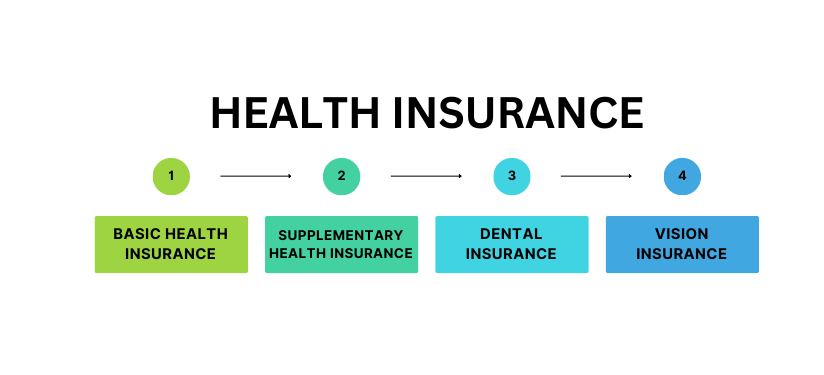
Basic Health Insurance: This is the mandatory health insurance coverage provided to all Israeli residents under the National Health Insurance Law. It includes essential medical services such as doctor visits, hospitalization, surgeries, and prescription medications.
There are four organizations through which you can get your basic health insurance that are Clalit, Maccabi, Meuhedet, and Leumit.
Supplementary Health Insurance: Supplementary health insurance is optional and can be obtained from various private insurance companies. It offers additional coverage beyond the basic insurance, including benefits like access to private hospital rooms, specialized treatments, and faster appointments with specialists. It allows individuals to customize their coverage based on their preferences and needs.
You can get your supplementary health insurance from different companies. The top ones are Harel Insurance, Menora Mivtachim Insurance, Phoenix Insurance, and Bituach Haklai Insurance.
Dental Insurance: Dental insurance in Israel is not typically included in the mandatory basic health insurance coverage provided by the National Health Insurance Law. Dental care is considered a separate aspect of healthcare, and individuals often need to opt for additional dental insurance plans to cover expenses related to dental treatments, check-ups, and procedures.
Dental insurance plans in Israel can vary in terms of coverage, benefits, and costs. These plans are usually offered by private insurance companies and can include benefits such as coverage for routine dental check-ups, cleanings, X-rays, fillings, extractions, and even more complex procedures like root canals and dental surgeries. Here are some dental insurance providers in Israel: Clal Insurance, Harel Insurance, and Ayalon Insurance.
Vision Insurance: Vision care is often considered a separate aspect of healthcare, and individuals may need to opt for additional vision insurance plans to cover expenses related to eye care, eyeglasses, contact lenses, and other vision-related treatments. These vision insurance plans can offer benefits tailored to eye care needs, including coverage for routine eye exams, vision correction devices, and other vision-related treatments.
Vehicle Insurance and its Types: Vehicle insurance in Israel is a crucial aspect of ensuring financial protection and accountability on the roads. Mandatory vehicle insurance, known as “Bituach Chova,” is a legal requirement for all vehicles operating in the country. This type of insurance ensures that vehicle owners are financially protected in the event of accidents where their vehicle causes damage to third parties, including property and personal injuries.
Harel Insurance, Phoenix Insurance, Bituach Haklai Insurance, and Shirbit Insurance are some top vehicle insurance providers in Israel.
There are three types of vehicle insurance in Israel that are as follows:
Compulsory Insurance (Bituach Chova): Compulsory vehicle insurance, known as “Bituach Chova,” is a fundamental requirement for all vehicles in Israel. This required insurance covers personal injuries, both to occupants of your vehicle and pedestrians. It is illegal to drive in Israel without a valid, paid Bituach Chova. Compulsory vehicle insurance is designed to safeguard both individuals and the broader community by providing a safety net against the potential financial liabilities arising from accidents. This coverage underscores Israel’s commitment to road safety and responsible vehicle ownership, promoting a more secure environment for all road users.
Third-Party Insurance (Tzad Gimmel): Third-party vehicle insurance, a legal requirement in Israel, plays a pivotal role in ensuring responsible and accountable driving. Referred to as “Bituach Chova,”. It does cover damages your vehicle causes to other vehicles or property. Damages are covered up to the policy limit. This type of car insurance is mainly appropriate for older vehicles with a low market value.
By promoting financial responsibility and mitigating potential disputes over compensation, third-party vehicle insurance contributes to safer roadways and a more equitable environment for all stakeholders.
Comprehensive Insurance (Bituach Makif): Comprehensive insurance in Israel serves as a comprehensive shield for vehicle owners, extending coverage beyond mandatory Third-Party Liability insurance. This type of coverage, often referred to as “Bituach Makif,” provides a broader safety net that encompasses damages to the insured vehicle itself. Whether caused by accidents, theft, vandalism, or natural disasters, comprehensive insurance offers financial protection for a wide range of scenarios. While not obligatory, comprehensive insurance is a popular choice for those seeking an enhanced level of security on the road, reflecting a prudent approach to managing the uncertainties of vehicle ownership in Israel.
Property Insurance and
its Components
Property insurance in Israel provides individuals with essential financial protection against potential losses and damages to their homes and belongings. This type of insurance, commonly known as “Bituach Nechasim,” covers a range of scenarios, including damage from fire, theft, natural disasters, and other unforeseen events. By offering compensation for repairs, replacements, or reconstruction, property insurance helps homeowners and renters recover from unexpected setbacks and maintain their financial stability.
It not only safeguards physical structures but also provides coverage for personal possessions, offering peace of mind in times of crisis. Whether it’s protecting one’s residence, contents, or both, property insurance in Israel underscores the importance of proactive risk management and contributes to a sense of security for individuals and families. Here are the most important components of Property Insurance in Israel:
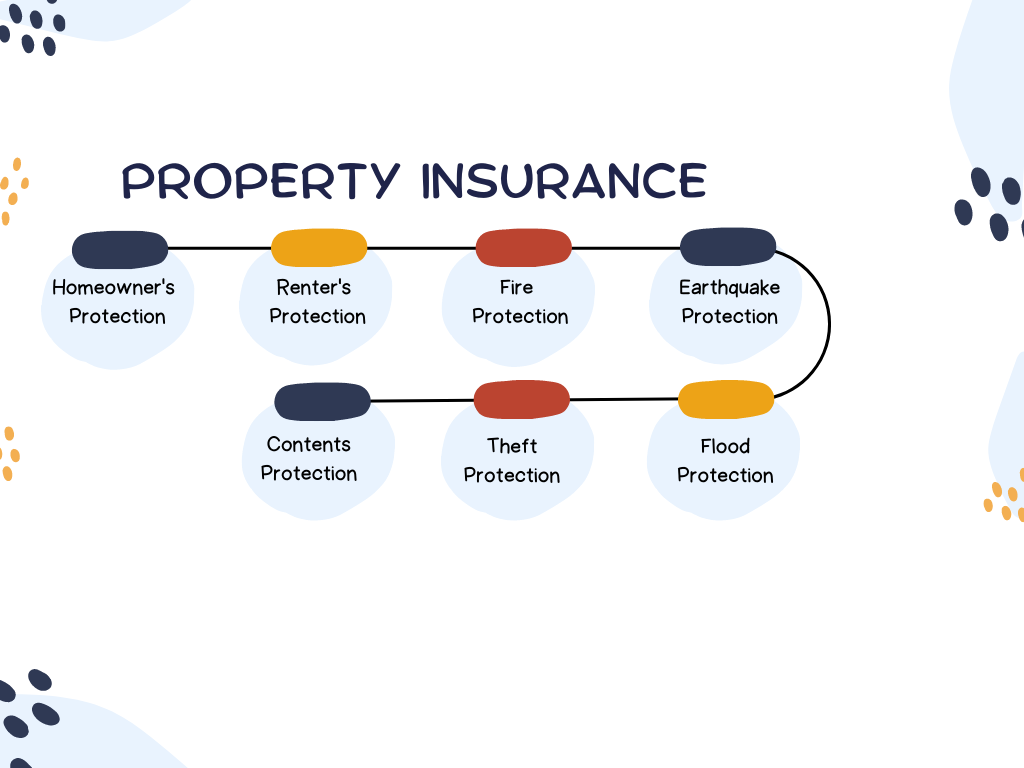
Homeowner’s Protection: This type of insurance provides comprehensive coverage for homeowners, protecting both the structure of the home and its contents. It typically includes protection against events like fire, theft, vandalism, and natural disasters.
Renter’s Protection: Renter’s insurance is designed for individuals who are renting a property. It covers personal belongings against damage or loss due to covered events, as well as providing liability coverage for any harm caused to others while on the rented premises.
Fire Protection: Fire insurance focuses specifically on protection against fire-related damages to the insured property. This coverage can be particularly important considering the potential devastation caused by fires.
Earthquake Protection: Given the seismic activity in the region, some property owners might opt for earthquake insurance, which provides coverage for damages caused by earthquakes and related events.
Flood Protection: While less common, flood insurance might be offered as a separate policy to cover damages resulting from flooding, a risk that can be relevant in certain areas.
Theft Protection: Theft insurance provides coverage for losses resulting from theft and burglary, reimbursing the policyholder for stolen belongings.
Contents Protection: Contents insurance specifically covers the belongings and possessions within the insured property against various risks.
Travel Insurance and its Coverage
Travel insurance in Israel provides essential coverage for individuals embarking on domestic or international trips, offering financial protection against a range of unforeseen events that could disrupt travel plans. This type of insurance, often referred to as “Bituach Te’uyah,” can include a variety of benefits such as trip cancellations or interruptions, medical emergencies, lost or delayed baggage, and even emergency evacuation.
Travel insurance is especially valuable when traveling abroad, where unexpected medical expenses and travel disruptions can be costly. It provides peace of mind, knowing that if unexpected situations arise, such as illness, accidents, or trip cancellations, travelers have a safety net to mitigate potential financial losses. Whether for leisure, business, or any other purpose, travel insurance in Israel serves as a practical and prudent investment to ensure a smoother and more secure travel experience. Travel insurance usually covers:

Trip Cancellation/Interruption: This type of coverage provides reimbursement for prepaid, non-refundable trip expenses if the trip is canceled or cut short due to covered reasons, such as illness, injury, or unforeseen events.
Medical Expenses: Medical travel insurance covers medical expenses incurred due to illness or injury during the trip. It includes expenses like hospital stays, doctor visits, prescription medications, and emergency medical evacuation.
Baggage and Personal Belongings: Baggage insurance offers compensation for lost, stolen, or damaged baggage and personal belongings during the trip. It can also cover expenses for emergency replacement of essential items.
Travel Delay: This coverage provides reimbursement for additional expenses incurred due to a travel delay, such as accommodation, meals, and transportation.
Emergency Evacuation: Emergency evacuation coverage ensures that if a medical emergency occurs during the trip and requires evacuation to a medical facility or back home, the associated costs are covered.
Adventure Sports Coverage: Some travel insurance plans offer coverage for adventure sports and activities, which may not be covered under standard policies.
Life Insurance and its Types
Life insurance in Israel provides individuals with a means to ensure financial security and support for their loved ones in the event of their passing. This type of insurance, commonly known as “Bituach Chayim,” offers a range of coverage options that can include a lump-sum payout to beneficiaries upon the policyholder’s death. Life insurance is designed to help alleviate the financial burdens that can arise from the loss of a breadwinner or a contributor to the household’s income. It can provide beneficiaries with funds to cover expenses such as funeral costs, mortgage payments, debts, education expenses, and daily living costs. Additionally, some life insurance policies in Israel might offer investment components that can grow over time, serving as a means of savings and wealth accumulation.
Life insurance is a very simple product. The insured pays the insurance company a premium so that in case of his early demise, God forbid, the death benefit that he has chosen will be paid to his beneficiaries. Usually, this is a large lump sum, but it is also possible to choose a death benefit that pays the beneficiaries a monthly income for a fixed number of years. By offering a measure of financial stability during difficult times, life insurance underscores the importance of planning for the future and ensuring the well-being of one’s family and dependents.
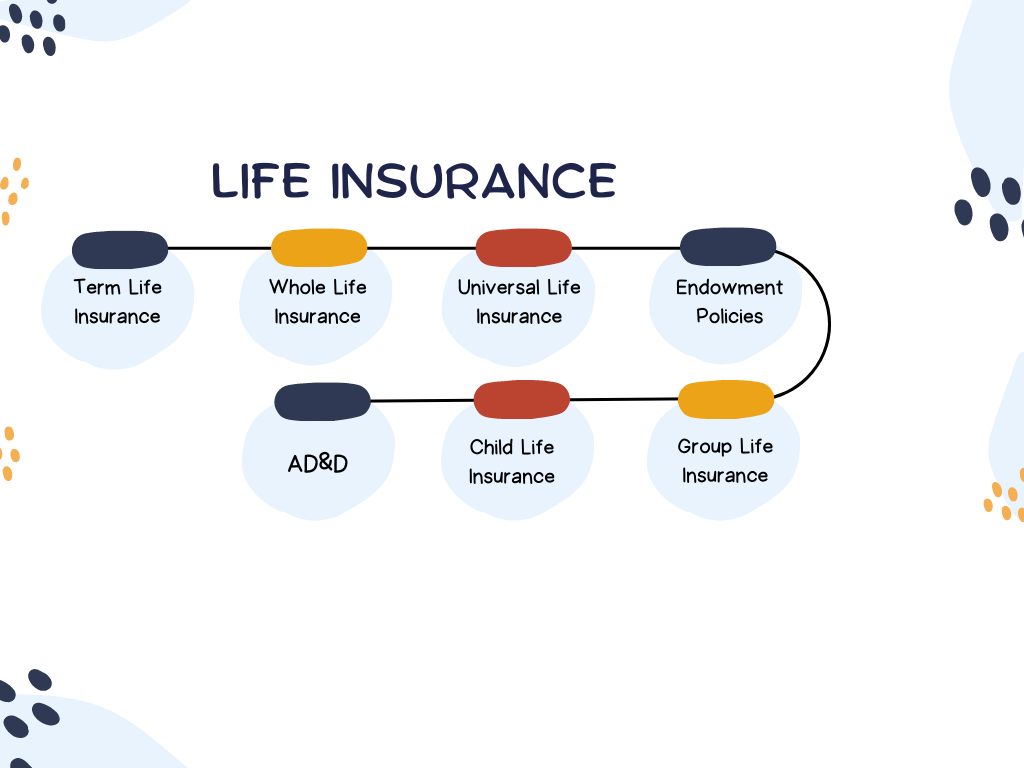
The main life insurance providers in Israel are Leumi Insurance, Hachshara Insurance Company, and Bituach Haklai Insurance.
Here are some common types of life insurance coverage available in Israel:
Term Life Insurance: Term life insurance provides coverage for a specific period, known as the term. If the policyholder passes away during the term, a death benefit is paid out to the beneficiaries. Term life insurance is often more affordable and straightforward.
Term life insurance will almost always give one the most death benefit for the lowest cost. It is best suited for temporary life insurance needs such as:
- Family protection while children are young and dependent
- Covering a mortgage or other debt
- Funding a business buy/sell agreement
- The cost of replacing a key employee
Whole Life Insurance: Whole life insurance provides coverage for the entire lifetime of the insured. It includes a savings or investment component, allowing the policy to accumulate cash value over time. Beneficiaries receive a death benefit upon the insured’s passing.
Universal Life Insurance: Universal life insurance combines a death benefit with a savings component. Policyholders have the flexibility to adjust their premiums and coverage amounts, and the policy’s cash value can potentially grow over time.
Endowment Policies: Endowment policies provide both life insurance coverage and a savings component. They typically have a fixed term, and if the policyholder survives the term, they receive a lump-sum payout. If the policyholder passes away during the term, the death benefit is paid out.
Group Life Insurance: Group life insurance is often offered through employers or organizations to provide coverage for a group of people. It can be more affordable than individual policies and might offer basic coverage for employees.
Child Life Insurance: Child life insurance provides coverage for a child’s life, often with the option to convert the policy to an adult policy later. It can help secure a child’s financial future and provide coverage for potential medical expenses.
Accidental Death and Dismemberment (AD&D) Insurance: AD&D insurance in Israel provides a specific type of coverage that focuses on accidental injuries and their potential outcomes. This insurance offers financial protection in the event of accidental death, dismemberment, or disability resulting from accidents. If the policyholder passes away due to an accident, the designated beneficiaries receive a lump-sum payment, providing support during a difficult time.
Critical Illness Insurance: While not traditional life insurance, critical illness insurance provides a lump-sum payment upon diagnosis of a specified critical illness, helping policyholders manage medical expenses and other financial needs.
Critical Illness Coverage is used to offset the costs of:
- The reduced income you’re earning since you likely either have to take a leave of absence or reduce your hours, and the regular price of daily living does not change – the mortgage, grocery, and utility bills still need to be paid
- Increased family costs including hiring a caregiver to take children to their after-school activities or help with homework while both parents are occupied with the ill family member
- Extra illness-related expenses like transportation to and from the hospital or treatment facilities, or accommodation expenses to be closer to the hospital on weekends
- The cost of flying in family members for extra support
Government Insurance Programs
These programs are designed to ensure the well-being and security of individuals and families in various life circumstances. One of the most prominent examples is the National Health Insurance (NHI) program, which offers mandatory healthcare coverage, including medical services, medications, and hospital care.
Additionally, the National Pension Insurance, known as Bituach Leumi, offers pensions, survivor benefits, and disability support. Unemployment insurance provides a safety net for those who lose their jobs involuntarily, while work injury insurance covers employees in case of work-related injuries.
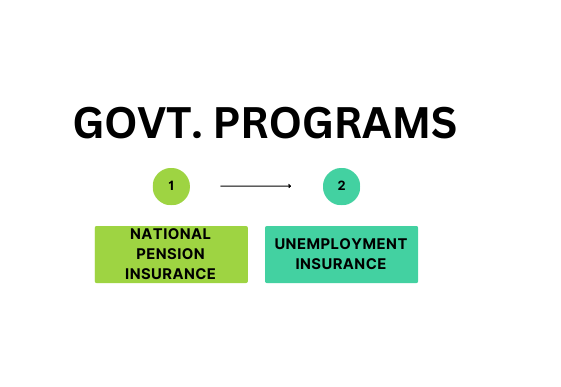
National Pension Insurance: National Pension Insurance, often referred to as Bituach Leumi in Israel, is a critical social security program that offers financial support and stability to eligible individuals throughout their lives. This program provides a range of benefits, including old-age pensions, survivor’s pensions, and disability benefits. Citizens and residents contribute to the National Pension Fund through their earnings, and these contributions form the basis for the benefits they receive in the future.
Old-age pensions offer retirees a regular income upon reaching retirement age, helping to maintain their quality of life during their senior years. Survivor’s pensions provide financial support to the families of deceased individuals, ensuring their dependents are cared for. Disability benefits offer financial assistance to those who are unable to work due to a qualifying disability. The National Pension Insurance program reflects Israel’s commitment to social welfare and economic security for its population.
Unemployment Insurance: Unemployment insurance in Israel is a crucial component of the social safety net, providing support and financial relief to individuals who find themselves unemployed due to circumstances beyond their control. Administered by the National Insurance Institute (Bituach Leumi), this program offers a safety net for those facing job loss by providing a portion of their previous salary for a specified period.
This financial assistance aims to help individuals cover essential expenses while actively seeking new employment opportunities. The unemployment insurance program acknowledges the challenges that can arise in a dynamic job market and provides a temporary buffer for individuals and their families during times of uncertainty.
Israel’s Housing System
- Overview of Israel’s Housing System
- Types of Houses in Israel
- Ways to Own a Home in Israel
- Stakeholders in Housing System
Overview of Israel’s Housing System
Israel’s housing system is a complex framework that encompasses various policies, regulations, and programs aimed at providing housing solutions for its diverse population. The country faces unique challenges due to its rapid population growth, limited land resources, and the demand for housing in both urban and rural areas. The housing market offers a mix of homeownership and rental options, with many citizens aspiring to own homes despite the high property prices, particularly in major cities. To address housing affordability issues, the government has introduced initiatives such as financial support for first-time homebuyers, the construction of affordable housing units, and incentives for rental projects.
The Israeli Government has set a goal of increasing the housing supply using reducing the existing barriers in the planning and building processes, about both new construction and urban renewal. In recent years, the government has taken several measures to simplify and streamline the “manufacturing” process for apartments. As a result, the total number of building permits issued by the planning committees has increased significantly.
Along with the increased supply, the government is actively working through several additional channels, aimed at solving the housing crisis. These channels include the integration of innovative construction technologies, enabling the participation of foreign companies alongside local companies in residential construction projects, and the improvement of the means of financing real estate projects via the equity market. In addition, the Israeli Government has been promoting affordable housing plans for long-term rental and first-time apartment buyers.
The erection of hundreds of thousands of new housing units in the coming years together with the development of the residential construction sector in Israel, create opportunities for companies and foreign investors to step into the market in Israel and to be part of this process. The housing sector involves both public and private entities. The government is actively involved in housing initiatives through agencies like the Ministry of Construction and Housing. Private developers contribute to the housing supply by building various types of residential properties.
Israel has implemented programs to increase the availability of affordable housing for low and middle-income individuals and families. These programs involve subsidizing housing costs, offering reduced mortgage rates, and providing tax benefits to eligible individuals. Housing cooperatives, known as “co-ops,” are a unique feature of Israel’s housing landscape. These are self-managed, nonprofit organizations where residents collectively own and manage the housing complex. Co-ops can offer more affordable living arrangements compared to traditional homeownership.
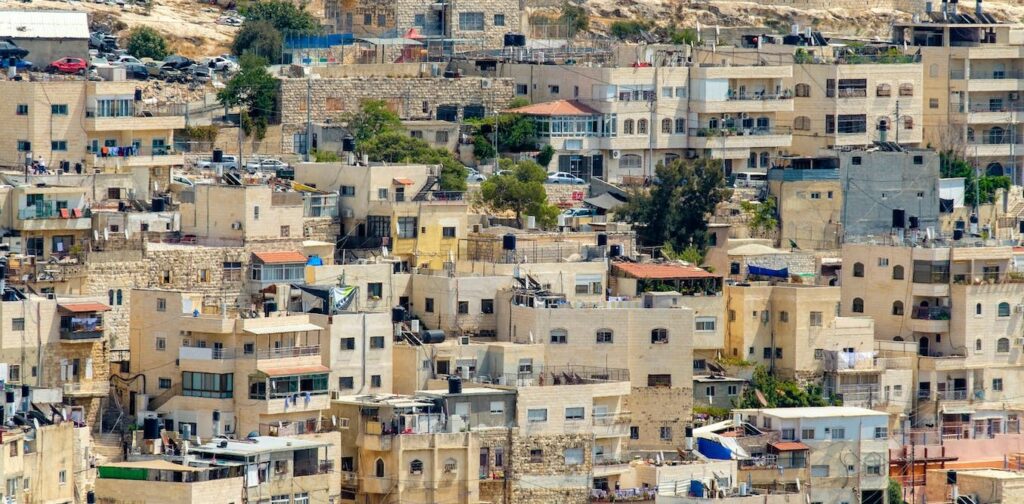
Types of Houses in Israel
Israel features a diverse range of housing types that cater to its diverse population and varying urban and rural landscapes. In urban areas, you’ll find a mix of apartment buildings, high-rise towers, and townhouses. Apartments are the most common housing option, varying from compact units to more spacious layouts. In cities like Tel Aviv, modern high-rise apartment complexes dominate the skyline.
Suburban areas often have single-family detached homes, providing more space and privacy. Villas and cottages are also popular in suburban and rural regions, offering larger plots and a sense of tranquility. Kibbutzim and moshavim, unique to Israel’s communal lifestyle, feature communal living arrangements with individual homes. The diversity of housing types in Israel reflects its evolving urbanization, cultural preferences, and the challenge of balancing tradition with modernity in its built environment.
The most famous house types in Israel are:
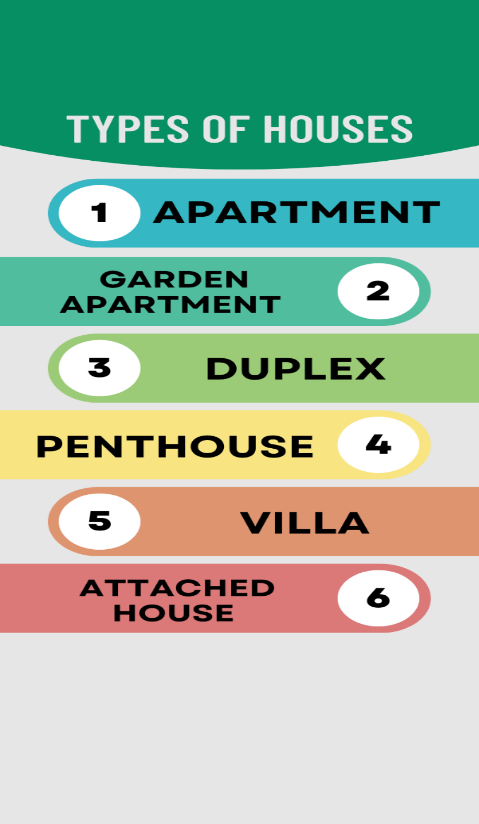
Apartment (dirá): A Dira is an apartment, flat, condo, or condominium unit on one floor in a shared residential building with shared spaces with other owners (such as a lobby, parking lot, garden, stairs, etc.). These multi-unit residential buildings offer a practical and efficient living solution that suits the density of urban environments. Apartments in Israel can vary widely in size, layout, and design, accommodating the diverse needs of its population.
From compact studios to spacious multi-bedroom units, apartments provide options for individuals, couples, families, and even seniors. The vertical orientation of apartment buildings allows for optimal land use in cities where space is at a premium. Residents often benefit from shared amenities such as elevators, security systems, and communal spaces.
Garden Appartment (dirát gán): A Dirat gan or garden flat is mostly a standard apartment, usually, on the first (ground) floor, with an attached fenced piece of land for exclusively personal use. These apartments, often located on the ground floor of multi-unit buildings, come with the added advantage of a private garden or patio. Garden apartments offer residents the opportunity to enjoy outdoor spaces for relaxation, gardening, or hosting gatherings, creating a connection to nature within an urban setting.
They are particularly appealing to families, pet owners, and those who appreciate the convenience of apartment living along with the benefits of outdoor living. The gardens or patios can be used for various purposes, such as creating a green oasis, setting up outdoor seating areas, or even cultivating plants and herbs.
Duplex: A Duplex is a standard apartment of 2 floors with internal stairs. The structure of such an apartment mainly depends on the first and second floors of the unit. If the apartment is located on the ground and the first floor, it will probably have a garden. If the apartment is located on the last and second to last floor, it will probably have a large balcony. This housing option provides residents with the privacy and layout of a standalone home while benefiting from the convenience and shared infrastructure of multi-unit living.
This configuration allows for separate entrances, creating a sense of individuality for each unit. Duplexes are favored by those who seek more space than an apartment can offer, yet prefer a less extensive footprint compared to a detached home. This housing type is particularly popular in neighborhoods where land scarcity and urbanization are prominent factors.
Triplex: A Triplex is the same as a duplex but with 3 floors.
Penthouse: A Penthouse is a big apartment located on the top floor with a massive balcony. Such an apartment is usually the size of 2 regular apartments in the building. Some of the penthouses are spread over the entire floor, whereas others share the floor with another penthouse.
These spacious and often lavish residences stand out for their premium features, which can include expansive terraces, private elevators, and high-end finishes. Penthouses in Israel are sought after by individuals who appreciate the combination of opulent living spaces and breathtaking vistas. With their unique location and design, penthouses provide a sense of urban retreat while still being in the heart of the city.
Mini Penthouse: A Mini Penthouse is usually located on one of the top floors. It is greater than a standard apartment and has a big open balcony, generally more than 322 sq. ft.
Villa: A Villa is also called a cottage in Israel. A Cottage is a free-standing house with a garden, with no shared walls. Usually, a larger and/or more luxurious cottage will be called a villa. Villas in Israel epitomize spaciousness, comfort, and suburban living. Villas come in various architectural styles, sizes, and layouts, catering to the preferences of diverse families and individuals. Characterized by their generous yards, gardens, and outdoor spaces, villas provide ample room for outdoor activities, gardening, and relaxation. These homes are particularly favored by families who seek a balanced lifestyle that combines the comforts of a modern home with the benefits of a larger property.
Attached House (du mishpachtí): A Du Mishpachti is a private house that has one shared wall with the neighbor. Most of these houses share a vertical wall, so each one has its garden. This type is the most common among the houses in Israel since you save space by sharing a wall, and therefore Du Mispachti will be cheaper than cottages or villas.
Attached houses are popular in both urban and suburban settings, offering a balance between the space of a single-family home and the convenience of shared infrastructure. Each unit typically has its entrance, contributing to a sense of privacy and autonomy. Attached houses often feature multi-level layouts, providing separate living spaces on different floors.
Ways to Own a Home in Israel
As an immigrant in Israel, there are specific pathways and assistance programs to help you own a home in Israel. Each way caters to different financial situations, preferences, and lifestyle needs.
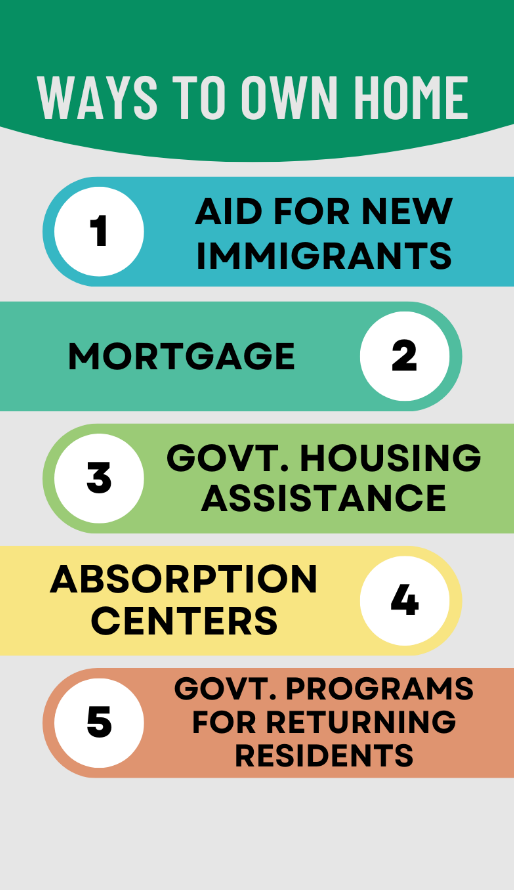
Aid for New Immigrants: Israel offers financial incentives and assistance to new immigrants (Olim) through programs like the “Buyer’s Price” program. This initiative provides eligible people with reduced prices for purchasing homes, making homeownership more attainable. The Israeli government recognizes the importance of providing support to newcomers, who wish to establish roots in the country.
These incentives aim to ease the transition for immigrants and help them realize the dream of owning a home in their new homeland. By providing accessible housing options and financial assistance, aid for new immigrants underscores Israel’s commitment to welcoming and assisting those who choose to call the country their new home.
Mortgage: Securing a mortgage is a common and practical way for individuals in Israel to fulfill their goal of owning a home. A mortgage allows buyers to acquire a property by providing a down payment while a bank or financial institution covers the remaining cost. This arrangement enables people to spread the financial commitment over a set period, typically ranging from several years to a few decades.
Mortgages in Israel offer various terms and interest rates, allowing buyers to choose an option that suits their financial circumstances. The process involves a comprehensive evaluation of the applicant’s financial stability, creditworthiness, and the property’s value. Mortgages provide an avenue for both native citizens and immigrants to invest in real estate and create a stable foundation for their future.
You can get mortgages from different banks in Israel. The most common are Bank Hapoalim, Bank Leumi, Discount Bank, and First International Bank of Israel (FIBI).
These mortgage options cater to different financial situations and preferences. Here are some common types:
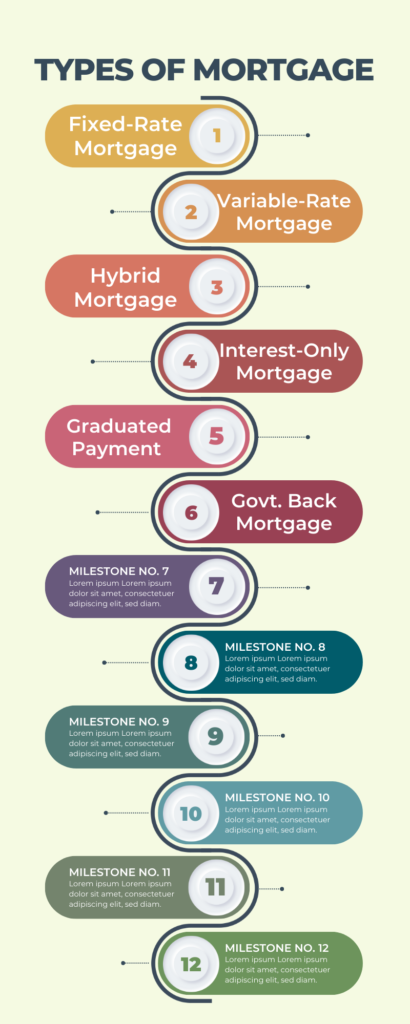
Fixed-Rate Mortgage: A fixed-rate mortgage offers a consistent interest rate throughout the loan term. This provides predictability in monthly payments, making it easier for borrowers to budget over the long term.
Variable-Rate Mortgage: Also known as an adjustable-rate mortgage (ARM), this type features an interest rate that fluctuates according to market conditions. Initial rates are often lower than fixed-rate mortgages, but they can change periodically, potentially affecting monthly payments.
Hybrid Mortgage: This type combines elements of fixed and variable-rate mortgages. It typically starts with a fixed rate for a certain period and then transitions to a variable rate. This can provide initial stability followed by potential cost savings if interest rates remain low.
Interest-Only Mortgage: With an interest-only mortgage, borrowers pay only the interest for a set period, usually around 5-10 years. After the initial period, the mortgage converts to a standard repayment plan, including principal and interest.
Graduated Payment Mortgage: This mortgage offers lower initial payments that gradually increase over time. It suits borrowers who expect their income to rise in the future but want lower early payments.
Government-Backed Mortgages: Israel has government-backed mortgage programs that offer reduced interest rates, making homeownership more accessible for certain demographics, such as young couples or new immigrants.
Foreign Currency Mortgage: Available to residents and non-residents, these mortgages allow borrowers to repay in foreign currency. However, they come with currency exchange risks.
Government Housing Assistance: These programs are designed to address the challenges of housing affordability, particularly for specific demographics like young couples, new immigrants, and low-income households. The Israeli government offers various incentives such as grants, subsidies, and reduced interest rates on mortgages to help eligible individuals and families purchase homes.
Additionally, programs like “Mechir Lemishtaken” offer affordable housing options through subsidized land prices and construction costs. These initiatives not only contribute to social welfare but also stimulate the housing market and support economic growth. Government housing assistance programs demonstrate the country’s commitment to ensuring that citizens have access to secure and stable housing, fostering a sense of community and belonging.
Absorption Centers: These centers provide temporary accommodation and essential support services for new immigrants, or olim, as they acclimate to their new environment. While absorption centers are not directly linked to homeownership, they contribute significantly to immigrants’ successful integration into Israeli society, helping them find their footing before embarking on their housing journey.
Absorption centers offer newcomers a stable place to live, language courses, job search assistance, and cultural orientation. By providing these resources, absorption centers empower immigrants to establish themselves in their new homeland, which can eventually lead to stable employment, financial stability, and the ability to pursue homeownership. While absorption centers primarily serve as a starting point for immigrants in Israel, their impact on helping individuals and families navigate the path to homeownership is undeniable.
Government Programs for Returning Residents: These programs offer valuable support to those who are coming back to the country after living abroad and are seeking to own a house. These programs recognize the unique circumstances of returning residents and aim to facilitate their reintegration into Israeli society. Offering benefits similar to those provided to new immigrants, these programs can include financial incentives, grants, and assistance with housing-related expenses.
They acknowledge the contributions and experiences of Israelis who have lived abroad and wish to reestablish themselves in their homeland. By assisting with housing, the government not only encourages Israelis to return but also recognizes the significance of maintaining strong ties with those who have spent time outside the country.
Stakeholders in Housing System
The housing system in Israel involves a diverse array of stakeholders, each contributing to the complex landscape of housing development, regulation, and provision. Government bodies such as the Ministry of Construction and Housing, the Ministry of Finance, and local municipalities play a pivotal role in formulating housing policies, urban planning, and overseeing regulatory frameworks.
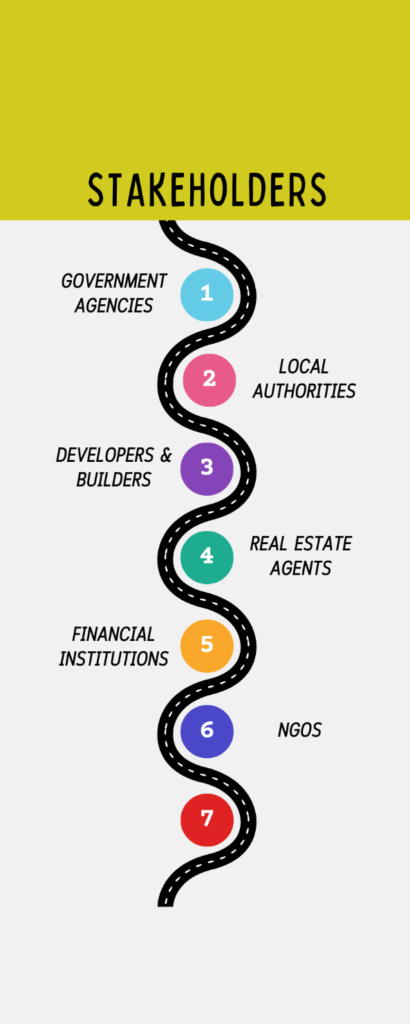
Real estate developers and construction companies drive the creation of housing units, while real estate agents connect buyers and sellers in the market. Financial institutions provide mortgage options that enable individuals to purchase homes, and non-governmental organizations (NGOs) focus on issues like affordable housing and advocate for housing policy reforms. Immigrant support organizations assist newcomers in navigating the housing market, and professional associations of architects, planners, and engineers contribute to the design and quality of housing projects.
Government Agencies: Several government agencies in Israel are actively involved in shaping and regulating the housing system. These agencies play critical roles in formulating policies, implementing regulations, and overseeing various aspects of housing development and management. Some of the key government agencies involved in the housing system in Israel include:
Ministry of Construction and Housing: This ministry is responsible for formulating national housing policies, urban planning, land allocation, and the implementation of housing projects. It aims to ensure the availability of diverse housing options and address housing affordability issues.
Ministry of Finance: The Ministry of Finance is involved in the financial aspects of the housing system, including taxation, incentives for homebuyers, and budget allocations for housing-related programs.
Israel Land Authority (ILA): ILA manages state-owned land, overseeing its allocation, leasing, and sale. It plays a significant role in land use planning and contributes to the regulation of the real estate market.
National Planning and Building Council: This council is responsible for formulating national planning policies and land use regulations. It approves master plans, urban zoning, and development regulations that guide housing construction and urban development.
Ministry of Aliyah and Integration: This ministry focuses on supporting new immigrants (olim) in their integration process, including housing assistance programs tailored to immigrants’ needs.
Ministry of Environmental Protection: While not exclusively housing-focused, this ministry contributes to sustainable urban planning and promotes environmentally-friendly construction practices.
Local Authorities: Local authorities in Israel play a pivotal role in the housing system by overseeing urban planning, land use regulations, and the allocation of housing resources within their jurisdictions. These authorities, including municipalities and regional councils, are on the front lines of managing housing needs and addressing local housing challenges. They issue building permits, manage zoning regulations, and plan for residential developments in alignment with national and regional planning policies.
Local authorities are attuned to the unique characteristics and demographics of their communities, enabling them to tailor housing solutions that meet specific needs. Additionally, they collaborate with developers, nonprofit organizations, and government agencies to promote the creation of diverse housing options, including affordable housing initiatives.
Some notable local authorities involved in the housing system in Israel are:
Municipalities: These are local self-governing entities that oversee urban areas, cities, and towns. Municipalities play a crucial role in urban planning, issuing building permits, managing infrastructure development, and ensuring that housing projects align with local needs and regulations.
Regional Councils: These authorities are responsible for rural and suburban areas, often encompassing multiple small communities. Regional councils manage land use planning, housing initiatives, and infrastructure development in their respective regions.
Local Planning and Zoning Committees: These committees operate within municipalities and regional councils. They review and approve building permits, land use changes, and development projects, ensuring that they adhere to local zoning regulations and contribute to the community’s overall development.
Local Economic Development Authorities: These entities work to attract investment, promote economic growth, and develop housing and infrastructure projects that align with their regions’ economic and social goals.
Developers and Builders: Developers and builders are pivotal stakeholders in the housing system of Israel, contributing significantly to the creation, expansion, and transformation of the country’s residential landscape. These entities are responsible for bringing housing projects to life, from concept and design to construction and completion. Developers identify opportunities for new housing developments, often working closely with urban planners to ensure their projects align with zoning regulations and the broader urban fabric. They acquire land, secure necessary permits, and oversee the entire construction process. Builders, on the other hand, are responsible for the physical construction of housing units, ensuring they meet quality standards, safety regulations, and design specifications.
In addition to private developers, there are government-owned housing corporations that focus on various segments of the population, including low-income families, new immigrants, and young couples. These entities contribute to affordable housing initiatives and promote social welfare.
The top Developers and Builders in Israel are Africa Israel Residences, Gindi Holdings, Azorim Construction, and Shikun & Binui.
Real Estate Agents: These professionals serve as intermediaries, connecting potential buyers and sellers and providing valuable insights and expertise throughout the process. Real estate agents assist clients in navigating the complex housing market, helping them find properties that match their preferences, needs, and budget. They provide market analysis, property evaluations, and negotiations, ensuring that transactions are conducted fairly and transparently.
Moreover, real estate agents offer essential guidance on legal and regulatory aspects, ensuring that deals adhere to the country’s property laws and regulations. Their comprehensive knowledge of neighborhoods, property values, and market trends is invaluable to both individuals seeking a home and investors exploring real estate opportunities. Overall, real estate agents contribute to the efficiency and smooth functioning of Israel’s housing system, aiding individuals and families in making informed decisions about their housing choices.
The top Real Estate Agents in Israel are RE/MAX Israel, Century 21 Israel, Anglo Saxon, and REHouse.
Financial Institutions: Providing the necessary funding and financial products that enable individuals and families to purchase homes. These institutions, including banks and mortgage lenders, play a vital role in making homeownership attainable for a wide range of people. Financial institutions offer mortgage loans that allow buyers to secure the necessary funds to acquire properties while spreading the repayment over a set period.
They provide various types of mortgage products, such as fixed-rate and variable-rate mortgages, catering to different financial situations and preferences. These institutions also evaluate borrowers’ creditworthiness and financial stability to determine loan eligibility and interest rates. Furthermore, they often collaborate with government programs to offer special mortgage terms and incentives to specific demographics, such as new immigrants and first-time homebuyers.
The top Financial Institutions in Israel are Bank Hapoalim, Bank Leumi, and Discount Bank We also discussed this in detail in the mortgage section.
Non-Governmental Organizations (NGOs): NGOs often focus on addressing specific housing challenges, promoting affordable housing, and advocating for policy reforms. These organizations play a vital role in advancing social welfare, supporting marginalized populations, and contributing to the overall accessibility and sustainability of housing in the country.
NGOs often collaborate with government agencies, developers, and communities to create comprehensive housing strategies that address diverse societal needs. By championing affordable housing initiatives, promoting social inclusion, and advocating for equitable housing policies, NGOs make valuable contributions to the welfare of Israel’s citizens and the development of its housing landscape. Later, Housing and Environment, and Amigour are some common NGOs.
